#he’s British and morally bankrupt too
Explore tagged Tumblr posts
Text
Genuinely surprised that (to my knowledge) Gentleman Ghost isn’t a Tumblr sexyman yet




Like look at him
#he’s British and morally bankrupt too#like he fits the bill so well#ever since he appeared in brave and the bold he’s never left my mind#peak character design#Batman#batman comics#gentleman ghost#jim craddock
73 notes
·
View notes
Note
Say, after reading your last commentary on Integra, now I need your POV on something I've been wondering.
What do you think will happen to Hellsing once Integra dies? To Alucard and Seras? Integra has expressed no interest in having children, and since she wants to avoid becoming a vampire, we know she won't be alive forever. Does she have a plan for that?
Hi! Omg so sorry to take so long to get to answering this, life has been insane on my end.
To answer your question, I'd wager there's a plan in place. Whether it pans out according to Integra's expectations or not is what remains to be seen. Integra mentions that the Organization will be passed over to the general military once she passes, and the Crown will thus assume direct control of the agency and its vampires. I'm willing to bet good money that the sigils that bind Alucard and Seras could potentially be transferred. If they are, then they'll keep up their job as the UK's resident vampire pest control until something extreme happens to break that bond of servitude. The nature of these sigils is unfortunately never explored fully, nor how they work, which leaves us with naught but speculation. However, this is my educated guess at how they probably work.
On the other hand, let's entertain the more interesting prospect of if those sigils are less malleable than we think, and it becomes impossible to bend Alucard and Seras to the will of someone else. From there? If the British military effectively has to try to keep these two under control through... What, good will? Threat of force? Both ideas are ultimately laughable. If that is the case, then I think Alucard is going to assess the inheritor's character and convictions. If he finds Integra's replacement to be unworthy, and there are no magic spells forcing him to play nice, then I think he probably peaces out to take a nice long nap. I think he probably goes into hibernation after Integra's passing - which, mind you, I think he'll be destitute following. It would be hard to read from him, but he holds Integra in high esteem, and went out of his way to return to her after Schroödinger-gate. That shows a high degree of loyalty, and I think Alucard would be laying low for a minute. After he wakes up, however, is when I suspect he might piss off into the unknown, wandering around the world - perhaps in search of interesting people to meddle with the lives of, secretly hoping he'll find the next Anderson, the next Integra, et cetera. I suspect he'll probably go right back to eating people, though. I'd put money on him perhaps being a bit more Punisher-esque on the humans he kills for food than before, since he has hinted at the idea of humans rubbing off on him in the series before. So less the kind of guy who devours the most innocent and defenseless people imaginable, and more likely he interferes with mortal affairs that he can justify to himself are morally bankrupt so he has a steady supply of enemies to destroy and humans to feed on. I don't see him turning all of England into a necrotizing wasteland with him at the head. I think that would beneath his interest by now. I think harassing and stalking people he deems unique or entertaining would occupy much of his time post-hibernation.
Seras, however, is interesting. I suspect Seras would stick around at Hellsing of her own volition, and would continue aiding Britain in its cause to protect people and slay undead monsters. That's what she became the person she is while doing, and I think with or without Alucard, she'll keep on generally being a goody two-shoes. But I think even she would grow weary of it eventually. With Integra gone, I think it becomes less and less like the home Seras "grew up" in - and if the new commanders are inept, then I think eventually Seras would reach a breaking point where she too, might go rogue. She might tag along with Alucard for a while, and I'd wager they keep regular contact and check in with one another on a semi-frequent basis (which, for vampires, might mean catching up once a decade or some shit). Seras is her own independent person, especially after accepting her vampirism and drinking blood to become autonomous as Alucard always urged her to be. But just as that's true, I feel their relationship was always one of Seras, despite everything, wanting to remain by Alucard's side. Their relationship would no doubt shift, and I suspect they might grow more reserved with one another, but I think they might find a new kind of emotional intimacy with one another - not romantic (I like Aluseras from time to time but this is my baseline read), to be clear, but I think Seras has the vampire equivalent of her late-twenties-development after Teggy passes. And from there? Anybody's game, but I think she keeps on bumping off rogue vampires - although I think with time, it might become more territorial than altruistic in how she carries herself. Less general heroics talk and more like, a vigilante warden type of dealio. She might come to see Britain as HER TERRITORY which would spell doom for any foreign vampires thinking they can feed on "her" humans. I think time as a vampire makes everybody go a little dark, but this is still pretty tame. It's Seras, after all. She'll flay you to ribbons but only if you really, REALLY press her.
Thanks so much for the ask!!!
#hellsing#hellsing fandom#hellsing ultimate#hellsing headcanons#my headcanons#ask box#alucard#seras victoria#sir integra
27 notes
·
View notes
Note
So… like, what was up with Hamilton and immigration?
Despite being an immigrant himself, Hamilton supported the Alien act of 1798, and he wrote under the name of Lucius Crassus that when it comes to Immigrants, it is: “unlikely that they will bring with them that temperate love of liberty, so essential to real republicanism.” (source: https://founders.archives.gov/documents/Hamilton/01-25-02-0282, by the way!).
I could go all in on this topic (hell, I might on my own history blog), but I’d like to hear your perspective on it. People rarely talk about Hamilton’s later attitude towards immigration, and it’s a rather interesting topic with a lot to uncover. Most of Hamilton’s points in the Lucius Crassus papers were political in nature (naturally), but would he have really insisted on shutting the ports on families escaping desperate situations, perhaps like he had so many years ago?
One again, it’s very strangely hypocritical of Hamilton to say this, so I think that you would find this interesting to cover! Apologies for the long ask!
A common fault when viewing this is the oversimplification, historical context and context in general is super essential here. And that's what I'll cover first;
The British West Indies were called such for a reason, they were British owned land. Nevis was prioritized as the international British trade for markets like the slave trade, sugar, rum, etc. But nonetheless, it was still considered part of the British Empire, and the citizens there were equally considered British subjects. So, Hamilton was already born a British subject just like the other founders. When Hamilton came to America in 1772, America was still also under British rule, and most of the people still considered themselves as “British”. And the term “American” didn't actually arise until much later during the revolution. Which essentially means, he was basically just moving around the empire.
Although despite the generalized perspective of labeling, it did not go without bias, and actually there was a massive division between cities and states. That is why you will commonly cross historical figures labeling others as Carolinians, Virginians, etc, because to them the difference truly mattered and that was mostly rooted with the different cultures and laws surrounding each state. This also evidently plays a part in the view of Hamilton as a citizen. Because that was just differences between states, so imagine how much more drastic it was for Hamilton who came from the Islands. Which here is where I'll start to delve more into Hamilton's identity as a “immigrant” that we all insist on calling him. The truth is, Hamilton wasn't an immigrant legally or metaphorically, and it's faulty to try and fit his identity in the cookie cutter modern terminology like “immigrant” because there are too many complications with all the layers of historical context you must take into account. I'm not saying Hamilton's struggles and the prejudice that he undeniably faced were not similar to the same turmoil many immigrants today endure, but he was moreso seen as an outsider or foreigner, rather than an immigrant. And that is majorly for two reasons;
Firstly, Hamilton placed himself between a rock and a hard space by moving to the Northern colonies—as a person who came from an area known for it's slave-trade, to an area that frowned upon the practice. And there's where there is a repeating distinction between states and their culture or beliefs, because the people in the North had a strong bias against the international trade Islands. The West Indies had a bad name to them for oftentimes being used as the penal colonies for petty criminals or the morally bankrupt by their definition, so many like women who committed infidelity, sodomites, thieves or smuggler traders were sent there. Additionally, their population was largely made up of enslaved workers and free people of color. So, assumptions were drawn about Hamilton when he came from this “lowlife” society.
Secondly, political disparage. A major culprit who utilized Hamilton's heritage and parentage against him that it became such a prominent part of his identity, was John Adams. For the same reason I just mentioned about the little respect the Northern colonies harbored for the West Indians. And as so, it made the perfect weapon of xenophobic stigma against Hamilton.
-
The overall point I'm getting to, is that it's debatable if Hamilton even saw himself as equal to the “Aliens” they were enforcing laws against. And I really don't think he did, Hamilton was able to separate himself from them because he was born a British citizen, and had been in the colonies by the time the Constitution was finalized and would have met the qualifications of an American US citizen. Also altering the residency requirements from five to fourteen years wouldn't apply to him anymore. Truthfully, Hamilton was ashamed of his Carribean roots (For obvious reasons, at this point), and naturally would have been inclined to hold himself in higher respect. Furthermore, during this time he was finally placed as second in command of the army and clearly thought lowly of the new immigrants;
To see the character of the Government and the country so sported with, exposed to so indelible a blot puts my heart to the Torture. Am I then more of an American than those who drew their first breath on American Ground? Or What is it that thus torments me at a circumstance so calmly viewed by almost every body else? Am I a fool—a Romantic quixot—Or is there a constitutional defect in the American Mind? Were it not for yourself and a few others, I could adopt the reveries of De Paux as substantial truths, and would say with him that there is something in our climate which belittles every Animal human or brute.
Source — Alexander Hamilton to Rufus King, [21 February 1795]
But in the end, Hamilton also knew he could never suit himself among the wealthy aristocrats and despite his shame, always knew he would forever be chained to his roots. He even refered to himself as a “Creole” (A derogatory term) and wrote to Jonathan Dayton;
But what avail laws which are not executed? Renegade Aliens conduct more than one of the most incendiary presses in the UStates—and yet in open contempt and defiance of the laws they are permitted to continue their destructive labours. Why are they not sent away? Are laws of this kind passed merely to excite odium and remain a dead letter? Vigour in the Executive is at least as necessary as in the legislative branch. If the President requires to be stimulated those who can approach him ought to do it.
Source — Alexander Hamilton to Jonathan Dayton, [Sometime after 21 December 1799]
It is my personal belief at least, that Hamilton accepted he would forever be in an in-between position in the classes of society. He saw himself as higher than most immigrants due to his citizenship and civil and military services meriting him a lot of respect, but ultimately knew he was different from most wealthy politicians and many were never going to accept him as anything but his Carribean heritage.
-
But something else that must be addressed, is what provoked the Alien and Sedition acts, more importantly the former, because there is a lot of necessary background. A large cause for the Alien acts was the French Revolution storming up. The rebellion for the French were becoming hostile, and tarnished their plausible foreign alliances after chopping off their king's head. But had still expected America - that was still in a fragile state of founding - to go to war with them and the British, when Americans had initially wished to remain neutral. So, while that hadn't worked out, that didn't stop many French citizens - who were not in support of their government, but still did not want to live under a monarchy - immigrating over to America. This may sound familiar, but many Americans believed that their country was not obligated to give refuge to these immigrants. And feared that they were dangerous, and part of the French government in a scheme. With that being said, this was rather an act against the French particularly, and the dangers they threatened the country with because of the ongoing war with Britain and France.
Take that into account, and it's also more than likely Hamilton didn't equate himself with these immigrants because they didn't even start out as British subjects. These were people all the way from Europe, and a country that at the time was hostile and pissed at them for not siding an alliance with them. The background and context could change the whole situation, and it could be that it was rather that Hamilton was merely against these immigrants under these conditions. But I do think my prior point is still worth noting, because we aren't sure what Hamilton's opinions were on immigrants in general, since in this context it is much less about innocent immigrants seeking refugee, but also the plausibility of the dangers they bring as being French. In the end, Hamilton's actions proved that jurisprudence likely took precedence over his own personal experiences or sentiments about the situation in question. But I do think it's fair criticism, but also expected? Hamilton could be an extremist in politics that it posed contradictions to his personal life, and also just sometimes he didn't live up to his own ideals. Hamilton even drafted the 1787 New York law that made adultery the only grounds for divorce, which excluded cruelty or abandonment. And, according to Chernow, he supported a bill against those who were divorced to remarry. Which is all quite questionable when you remember his own mother's situation.
#amrev#american history#american revolution#alexander hamilton#historical alexander hamilton#alien and sedition acts#john adams#history#queries#sincerely anonymous#cicero's history lessons
47 notes
·
View notes
Text

"Debanking" is being touted as the newest way for the government corporations to discipline unwary and rebellious franchises.

Apparently, even the Big Tech Corporations don't know that they surrendered their ownership interest in their own businesses when they registered as District of Columbia, Inc. or subsidiary British Territorial State of State Corporations.
Apparently, they don't know that the debits in their bank accounts don't stand for money, that they are all bankrupt by definition, and that even if the courts and parent corporations steal every single Federal Reserve Note in sight, they can't be accused of theft, because -- technically, none of these "representations of value" have any value at all. Federal Reserve Notes are not negotiable instruments.
So, you see, those doing the "debanking" have no liability no matter how much debt-credit they steal, and the crooked Maritime Commercial Banks cannot be held accountable nor can they be forced to provide any replacement public banking service, because they are all conceived as private banks that are members of a little private bank cartel club.
The best thing we can do with them is to withdraw the Federal Reserve Notes as proof of their debt and their crime, and boycott them while providing ourselves with our own banks and our own banking services and our own currencies as well.
All the "debanking" does or proves, is how coercive, controlling, and self-interested these predatory banking institutions are. They need to go --- root, stem, and leaf. Right out the door and down the storm drain, together with the criminals who have promoted this insanity.
By accident, they may be preventing some corporations from participating in acts even more criminal than the acts the banks depend on themselves, but otherwise, it's purely by accident if any good comes from it, and otherwise, "debanking" is arbitrary punishment of corporations that don't fall in line with the parent company's policies.
Some people have mistakenly seen "debanking" as a tool to get rid of or greatly marginalize corporations which have become too crooked and too powerful. If it were used for that purpose, it would be a halcyon step toward accountability in the corporate world, but it's not.
The corporations most likely to be debanked are the competitors the Bad Guys want to squelch, those corporations that have moral directors, those corporations that want to do some good in the world, or that own patents or property that the Vermin want to force them to sell.
The criminals running the Maritime Commercial Banks have simply reached a new and more self-evident "low". They obviously think that they are the only game in town and can do whatever they want to do without regard for any property interests belonging to anyone else, whatsoever.
They have no gratitude for their own charters and licenses. They think that nobody can or will get organized to take them down.
But we will; indeed, we have to, because the Roman Catholic Pope who is supposed to be liquidating corporations engaged in unlawful activity, isn't doing the job and hasn't done the job for a long time.
In fact, there's not even a Pope anymore. No agreed upon enforcement at all.
For those who need to know, all the forms of corporations that we are now too familiar with, have been created by the Roman Curia, and as creators, they are responsible for their creations under Roman Civil Law.
The national governments agreed to the proliferation of corporations which began accelerating in the 1850's with the understanding that the Roman Curia's creations would be subject to liquidation under Ecclesiastical Law and that the Popes would be the executive officers responsible for liquidating Bad Corporations.
As of 2011, the Office of the Roman Pontiff has been dissolved, and except for the Curia itself, there is no liable authority to be held accountable.
Benedict XVI split the offices and responsibilities of the Pope. He liquidated the Office of the Roman Pontiff and the underlying Romanus Pontifex and Urban Trusts, leaving the clean up and wagon-circling to his loyal Jesuit soldier, Jorge Bergolio.
Benedict XVI kept the sacred "Ministerial Office" for himself, and died without passing it to Pope Frances or anyone else. No provision for a succession was made. Benedict XVI was literally the last Pope to hold the sacred ministerial office.
We can observe this directly. And we can see the scuttling that went on, with the Church of Rome transferring huge amounts of money to the Eastern Orthodox branch of the Church still in Constantinople, and the quid pro quo granting Pope Frances a cover as "Patriarch of the West".
Just as the Church bifurcated into East and West in response to the fall of Rome, it is once again, bifurcating to Turkey, falling back, and entrenching --- right before our eyes. The Trojan-Phrygian roots of both the Roman Church and Rome itself could not be clearer.
The Curia, for its part, refuses to undertake the role it is heir to, and is in gross default for failure to liquidate corporations that it technically has created --- both as commercial corporations and as municipal corporations --- that are operating unlawfully and causing harm to living people.
They could, for example, liquidate Pfizer, Incorporated, without breaking wind, but since the great Covid-19 debacle, Pfizer has been very profitable and profit is what defines the Curia's standard of "good". The ancient Trojan-Phrygian Death Cult they represent worships Mammon and Mammon is happy as long as profit rolls in.
Lots of profit.
They don't care how the profit is made, how many lives are lost, or how much property is destroyed, so long as it turns a profit. The more profit the better. They will get up on their fettered feet and dance around and chatter like magpies and do a queer rendition of Hasidic Jews in ecstasy, so long as there is a fat profit.
Yes, the world we live in is far stranger than most of us can imagine, but it is what it is.
The corporate realm has become a runaway train, because nobody is at the helm--- at least, nobody responsible and sane.
Think about an actual runaway train -- a million metric tons on steel rails, hurtling along under speed. Imagine the last brakes and restraints being sheared off the tracks, like so many clothespins. Everyone on the train jumps off while they can, risking life and limb to tuck and roll ---- until it is just a runaway train, empty, nobody at the wheel, hurtling on and on, until it runs out of fuel or crashes headlong.
Pope Frances jumped off the train two years ago.
That's the world we are living in now, and the men at fault for this, couldn't care less, so long as they make a profit. From their perspective, it's six of one, half a dozen of another. They don't care if they are in bed with Hitler and Bonaparte or Churchill and Stalin; they win, either way and every way, because they fund both sides and stand to profit from the preservation of infrastructure or the destruction of infrastructure. Either way, it makes no difference to them.
Sometimes they even prefer destruction, because it gives them more control, and an opportunity to update things, start over.
Remember: order comes out of chaos, so they are happy to create chaos, just as they are happy to be the ones imposing order afterward.
This is just a restatement of the Hegelian Dialectic. Cause the problem and then profit from solving the problem.
Just like Trump is doing. Cause the problem: Project Warp Speed.
Solve the problem: Make America Healthy Again.
We could have done without either one. We could have had peace and plenty instead. We could have had uninterrupted health and progress. We could have enjoyed our lives and done something fun --- but these criminals had to pull their stunts.
Think of the cretins letting mayhem reign all summer long in 2020, and then turning off their ginned-up riots like a dried up water tap, just in time to promote the "crack down" on the January 6th Protestors, who didn't murder anyone or cause any substantial damage at all.
Senator John Kennedy called these crooked Perpetrators "goofy people", with an "unwarranted sense of moral and intellectual superiority".
They are not moral, not intellectual and not superior. They are simply bags of wind without a conscience, walking appetites whose limited brain power is devoted to crime and self-advantage, and by no means are they superior to the simplest songbird perched on a twig.
Their greatest claim to fame rests on being alive, a gift that they do not deserve, based on their own actions.
This is the moment when we witness things like The Black Plague. Let's face it, the biological warfare these cretins have already released isn't that much different, just higher tech. This is when they poison the wells --- or the skies.
They are not going to take responsibility and destroy any of their corporations for Bad Behavior; morality long ago became "relative" for them. There's no good, no bad, they say. There's just profit and loss.
They have no wives or children to worry about, no connection to biological life beyond their own abused and fragile frames. This is how they come to value institutions and corporations, and forget the value of living men --- because of their own deadness, alienation, and isolation.
How dare we say this? Why shouldn't we? It's true. We're not afraid of runaway trains, demons, or crazy people. They are the ones who should be afraid of us.
The Earth and everything that exists, walks, crawls or swims, all that grows and all that flows, every grain and plant, every animal, all of it, is ours and belongs to our Lord, the True Son of the Living God.
So move over, Mammon, you disgusting old idol; be gone, you have no power here. Farewell, Satan, and all your lies; the Age of Pisces is over and all the delusions are lifting like fog, burned off by the morning sun. People will laugh and shake their heads.
"Nothing but a big pile of lies," they will say.
"It was some kind of madness, like the Tulip Mania," they will opine.
Ask yourselves, what nonsense is this, that living men need to destroy things that only exist on paper? Legal fictions that have no substance of their own?
They don't exist already.
We are only bound by our beliefs, and as we are bound, so we are unbound. We gave these fictional things form. We gave these fabrications power over us, and we can take back any power we gave them, too.
We won't spend our lives shadow-boxing phantoms created by the Roman Curia.
#blacklivesmatter#blackvotersmatters#donald trump#joe biden#naacp#blackmediamatters#blackvotersmatter#news#ados#youtube
0 notes
Note
chaya this is too much power I can just send you a string of things I am already 100% aware of your opinion on like 💛💙🖤🏳️🌈
You're straight up choosing violence.
💛: What is a popular ship you just can't get behind, and why? In any canon-adjacent setting: Jegulus. James is straight, also he viscerally hates all Slytherins (says straight off he'd leave Hogwarts if he were sorted there, proceeds to spend the next 7 years fighting with Slytherins), and as someone who has a perfect gorgeous charming older sibling who everyone prefers even to this day... sorry, even taking the "James is straight" and "house rivalry not a joke during a major war" out of the equation, Regulus would fucking hate James on principle of being Sirius's friend, let alone "like a brother" - particularly after Sirius ran away to live with James instead. This isn't to touch on the "Regulus joined a pureblood supremacist death cult at 16 and had a war crimes collage in his room" thing that Marauderstok likes to just pretend never happened. Regulus might've gotten over his younger sibling complex esp re: James in a good 10-20 years like I have with my sister (I even tell her fiancé that she and her best friend are like sisters!), if he hadn't. you know. died at 18. but James is still straight. also Dramione, in basically any setting lmfao. He signed up literally to murder people like her, and while I can see her forgiving him as he improves as a person, like... the reason drarry works is the mutual obsession. Dramione is two people doing the don draper "i don't think about you at all" as Draco fixates on Harry and Hermione fixates on school. Despite the giant essay for jegulus and the tiny paragraph for dramione, if i had to pick one i dislike more, it's dramione 100%. jegulus i mostly just do not understand at all because it's so opposed to my understanding of the characters. dramione has that and also the ick factor. and also all the self-inserts. let hermione be a bossy pushy know it all!!! let draco be a sad pathetic weasel!!! Drarry I like, though, and Harmony was my first HP ship and while I'm not an active shipper anymore, I have been known to enjoy it. Wolfstar is fine. I think that's all the HP juggernauts.
💙: Which character is not as hot as everyone else seems to think? Regulus Black. canonically described as "rather less handsome than Sirius had been". Biassed character saying "Regulus is hotter than Sirius" is fine, but the whole fandom seems to not understand what "rather less handsome" means in British (hint: "not handsome")
🖤: Which character is not as morally good as everyone else seems to think? Regulus Black. also Barty Crouch Jr holy fucking shit???? guys Barty is completely morally bankrupt and straight up evil he enjoys traumatizing and torturing people. he transfigures a child into an animal and then jerks him around in public just because he can. also James and Sirius and Remus too, though they're at least like, politically in the right.
🏳️🌈: Which character who is commonly headcanoned as queer doesn't seem queer to you? James Fleamont Potter. Kinsey 0. come on.
1 note
·
View note
Text
Isn't Kate supposed to be helping George with his exams and why she's not in Singapore with William?
By Stanley Collymore Kate is obviously simply not a Colonel in the British Army or for that matter either legally or speciously actually entitled to be holding any rank - effectively officer or otherwise - in quite unquestionably any branch whatsoever of the British Military in which she has undeniably never actually served or realistically is ever likely to do so! And currently isn't there evidently a clearly senior British police chief superintendent currently suspended, and similarly under investigation, for the falsely and egotistically quite ludicrously and likewise most ostentatiously, wearing a Falklands War Combat medal pertinent to a conflict he'd very clearly never participated in; and obviously literally insultingly so, because when basically that war began and similarly when it concluded, he was undoubtedly still essentially far too young to even enlist in any branch of the British armed forces at his age. So why exactly are all these very cowardly and bogus patriots simply liberally, adorning themselves with medals and titles for gallantry, when rather essentially the only gallantry, of distinctively a very sick and pernicious nature on their part, is for these narcissistic sorts of toxic vermin to actually defend Britain effectively to the last drop essentially of other peoples' very precious blood, but categorically never their own? But undeniably, none the less, simply irrefutably evidently do love dressing up in these military fatigues, for their clearly vainglorious and falsely proselytized chivalry idiotically in situ with a bogus patriotism. So please, Daily Mail, do stop disrespecting those who've very genuinely, sacrificed so much in the authentic defence, of our country while simply doing so in the specifically distinctive branches of our Armed Forces. For obviously apart from being basically nothing more than clearly a rather fatuous unquestionably dress-up, clothes' horse, Kate Middleton is crucially nothing more important than the evidently biological offspring, of undoubtedly financially dubious and rather discernibly also, very evidently likewise quite morally bankrupt, balloon sellers - and who herself basically got lucky and quite principally through a dozy prince conjoined with her own relentless stalking of him crucially won the requisite life lottery which she - rather ably and earnestly assisted by her social climbing mum - clearly and literally distinctively was discernibly after. And frankly that's your Kate; nowt more! (C) Stanley V. Collymore 9 November 2023. Author's Remarks: The entire so-called royal family of the UK simply comprise the descendants of a medieval mafia family, who rather effectively then and now are those with the biggest sticks and self-evidently the nastiest personalities to essentially use them! And who essentially can actually blame them when they obviously are distinctly aware - these quite inured sadists - that they evidently have a surfeit of crucially masochistic morons, distinctively and most unquestionably just like yourself, routinely and sycophantically blissfully fawning over them. Welcome to Medieval Britain that quite realistically never went away!
0 notes
Text
The US watching the British conservative party turn on their morally bankrupt leader when he's gone too far:

4K notes
·
View notes
Text
No Quarter - Phantom Blood
A more platonic tale of mine. Please enjoy.
https://open.spotify.com/playlist/6fEHBOw4nLAvrmnIkW8yPJ?si=s9PG2NzdRp-lDFRAWW8ffw
She was a stranger in a very strange land.
The bright sun shone down on the British countryside. It had been miserable the past few days, being cold and snowy. It was so different from the Italian summers she was used to, and the eternally dry and cold Himalayas she had trained in. It was wet, and lingering. It seeped into your bones and stayed with you for days. The sun felt so good. It was nice to not be freezing constantly.
She had been sent here on an important mission. She was searching for recent vampire activity. Vampires tended to be chaotic forces that only did harm to the people around them. They gravitated toward the helpless and the morally bankrupt. That was why Hamon users like herself were often tasked with hunting them down and ending their miserable existence. That was why she was here. She was a stranger in a very strange land. And she didn’t like it much.
Something had happened out here. Something strange. An incident happened over a week ago at the Joestar manor. The Lord, George Joestar had fallen ill recently. In desperation to save his father, Jonathan Joestar left for London to find a cure. After three days, he returned. There was a confrontation at the manor with his brother Dio Brando. Everything fell apart then, leaving most people involved dead. The manor itself had caught fire, half of the structure laying in crumbled ruins. The other half, nothing but a broken shell.
She stood before the manor, in front of where the front door once stood. If her intuition was right, there had been some vampiric happenings here. She just had to find it. She wrapped her dark cloak around her and stepped into the mounds of ash, of broken glass, clumps of half-melted metal ornaments, charred furniture, fallen beams, and caved in walls. So much rubble, so much lost in just one night.
She had been sent here a few months ago. Tonpetty, her master, had seen premonitions of a great vampiric evil rising and taking hold here in Britain. If it was not put to an end, great calamity may befall the world. She was his scout, getting a lay of the land before Tonpetty, along with Dire and Straizo followed behind to deal with the threat. Somehow, the birth of one vampire would need to be dealt with by three of the strongest Hamon users in the world.
She flipped a large stone over. She wondered why Tonpetty had sent her to do this. While she didn't consider herself weak or unskilled by any means. She mostly felt she was inexperienced. She hadn't traveled and explored like most of the other Hamon users she had trained under, or the many others she had heard stories about. Off all the people who had vowed to serve under Tonpetty, why had he chosen her? There were hundreds of Hamon users and monks that could carry this mission, probably better and faster than her.
Something caught her eye. Through a scorched doorway, sitting in a beam of sunlight, there was a large hole in the rubble. It was too deep to have been dug by thieves, or by past inhabitants looking for prized possessions. She walked through the door frame and knelt beside the gash. It was the size of a large man, several inches deep. From the claw marks in the ash, it looked like there were at least two people here. One person who dug down to get to something. And one person... Who dug himself out of the hole. She couldn't be reading that right. Could someone have been buried alive? Was it the vampire she was after? If there was some sort of struggle with a vampire the night the manor burned down, he was still alive and had at least one zombie helping him. If her guess was correct.
The question is, where would they go next? There was a lot of chaos in London at the moment. It would be an ideal spot, with a lot of potential victims and places to wait out the day. But that might be too obvious. England had a lot of small villages to lay low in, away from the newspapers and prying eyes. Depending on what he is planning on, it might be more advantageous to begin her search in the countryside.
She moved her way out of the dilapidated building and into the warm sunlight. She looked down at her cloak when the light hit it. Ash spotted the bottom of the dark fabric. Normally, something like that wouldn't bother her, but this cloak was special to her. It was a gift to her from her father. He gave it to her before they started their long trip to the Himalayas. She had wanted to become a Hamon user like him, and he knew she was not used to the cold after living under the Italian sun. He turned out to be right. She bent down and brushed what she could off. It would have to do for now.
She looked off into the rolling hills and long winding streams in the distance. She would have to talk to some of the locals. They might have seen something or know what happened. But that would require finding people, and then actually talking to them. She didn't know where people lived out here or how to approach them. Another problem was that she would have to talk to them. She could speak English well enough, but her accent would give her away. That could make people distrustful of her. Others like Straizo and Zeppeli had travelled enough that they could copy the accent of the area and blend in. She had not encountered enough people to get a good handle on the British accent.
She looked around. There was a stone path nearby. Maybe there would be someone having a stroll or... Something. She let her cloak swirl around her and began walking towards the flagstone trail. This was not part of her training. All the breathing exercises, and the meditation, and the grueling workouts, there wasn't anything on information gathering. Maybe it came natural to some, but definitely not to her. How was she even supposed to do this?
A little ahead of her, a young couple was making their way down the path. A tall man, built like an ox, walking with the help of a cane. With him was a blond woman, arm locked onto his, also aiding him with his walk. From what she could tell, the man had probably been injured recently. A few bindings could still be seen from under his shirt and he was walking with a slight limp. One of his arms was supported by a sling. Could he have been involved in the incident? There was only one way she would find out.
She stepped out in front of the couple, standing awkwardly in the middle of the path. Her mind was spinning and trying to conjure up something to say. She took a deep breath in. Held it. Opened her mouth.
"Excuse me," Her voice sounded strange even to her. The couple gave confused, but not hostile expressions. " My name is (Y/N). I need to know what happened to the house up there." She pointed to the destroyed manor at the top of the hill.
The lady looked the Italian over, a strange accent draped in dark fabric. "Why do you need to know?" She cautiously asked.
"I... Ah...:" (Y/N) was seized with anxiety. How do you explain this? To strangers! Things were getting out of hand already.
The man smiled. "What is it?" The lady gave him a questioning look. He rubbed her arm in reassurance.
(Y/N) looked between the two, trying to figure out what to do next. What does she even say? Do these people even know that vampires exist? How does she explain that she was hunting down a being that could end the world? She mulled over her words before she spoke.
"My friend worked at the Joestar manor," she squeaked out. "I had planned to visit her today, but I did not know it had burned down."
The man gazed up at the cold ruins. His eyes seemed to be looking back, seeing something that wasn't there any longer. He turned back to the girl, a smile on his face again. "I'm sorry to hear that. Please, walk with us. I need to keep moving to heal properly. This is what I heard happened..."
They walked together, the man giving the story the girl already knew. A sick father. The Joestar heir leaving for London. A fight on Ogre Street gaining him an ally and an antidote. A confrontation on returning home with Dio Brando. An accident leading to the manor catching fire. He told her that some of the staff escaped, so that her "friend" may still be alive. He didn't give any new information, and it felt like he was hiding something.
The entire time, the girl noticed a strange figure trailing them. It might be an enemy, though it might be some person on holiday taking a stroll. She would have to be wary.
The man came to the end of the story. They had walked in a large circle, not wandering far from the manor. The girl had planned on asking the couple if there was anyone else she could ask, becoming anxious again that she would have to do this all over again. But before she could do anything of the sort, they came across a man sitting on a low stone fence. He took out a shaker to season the sandwich in his hand.
(Y/N) recognized him immediately. She began to relax again. He was a close friend of her father's, and he had trained her for a bit back in the Himalayas. Baron William A. Zeppeli. He took a bite of his sandwich, looking over the small group. He gave a sly smile.
"Mr. Jonathan Joestar," he put the shaker back into his pocket. "The lovely lady on your arm must be Erina Pendleton."
The girl looked over the two of them. Her feeling had been right. There was more to them then they had let on. But she didn't think he would be Jonathan Joestar himself.
Zeppeli launched himself into the air, not moving a muscle. It was one of his favorite tricks to do. "You have done well against the mask. But it, and the man who wears it still lives!"
That was all she needed to know. She stepped aside, knowing what would happen next. Using the force of his descent, Zeppeli extended his finger and plunged it into Jonathan's diaphragm. Jonathan hit the ground, having all the air forced from his body. Erina went to his side.
"You cad!" Erina accused. "He was already injured!"
(Y/N) remained quiet. This was all part of learning Hamon, something even she had gone through. If Zeppeli was doing this, he must have known what happened that night. He must also know that a dangerous vampire was on the loose. Having someone who knew what he was doing was a comfort to her. Finally, she wasn't alone in this strange endeavor.
After a few seconds, Jonathan clutched his arm, the one that had been held in the sling. "The pain," he muttered. "It's completely gone." He moved his arm back and forth. He reached over and picked up a large rock, one that would take a normal person both arms to lift. "What did you do?"
Zeppeli perched himself on the stones again. "I did nothing, Jonathan. I only unlocked the power within you. It was your breathing that healed your wounds." He took out his shaker again, seasoning another sandwich that seemingly materialized in his hand. "Forgive me, (Y/N). It is good to see you again. I assume that if you are here, then you must know what has been going on recently."
She gave a small bow. "Yes. Master Tonpetty sent me here. He has had visions of great evil rearing itself. He and a few others will be following behind to help deal with the threat. I didn't know you had been informed as well."
"I wasn't," he said with confidence. "I just followed the stench of death and evil."
"Then," Jonathan formulated, 'You did not come out here to find this friend of yours?"
She shook her head. "No. I am sorry to have lied to you, but I had to keep my mission a secret. Do not forget that you also kept information from me." She fiddled with the edges of her cloak.
Zeppeli sneezed. "That's not what's important. Your compatriot here has fought against the stone mask. He has shown great courage, but courage alone will not defeat its wearer."
"What are you talking about?" Erina asked, pulling Jonathan to his feet. "You seem to know a lot about us, yet we know nothing about you."
"I will answer all your questions in time," Zeppeli sneezed again, standing to his full height. "First, you must be ready to change your fate once again. Follow me."
He led us to a nearby river. An ancient castle lay in ruins, leaving large stone scattered around the ground and into the river. A tall set of stairs sat on the riverbed, leading directly to the water below. It seemed to be devoid of life except for a few frogs that had come up from beneath the mud. It must have become warm enough for them to swim without dying.
Zeppeli stepped into the warm flowing water. "Join me, (Y/N). We must show them the power of Hamon."
She slowly nodded. She unfastened the clasp on the front of her cloak. Removing it, she carefully hung it from a nearby tree. She eased herself into the water and waded over to Zeppeli.
"Hold out your hands, (Y/N)," He commanded. She did as he asked. He slid a small feathery object into her outstretched hands. After she took a closer look, she realized it was a small bird. The way it held itself, she could tell that it had a broken wing. It probably was attacked and managed to escape. In its current condition, it would not live long.
"I found this bird a while back," Zeppeli announced. "With Hamon, its broken wing can be fully restored. In the East, it is called Sendo. The Way of the Hermit. It is the breathing technique that healed your arm, Jojo." After speaking to the small crowd, he gave the girl a nod.
She swallowed. She always hated demonstrations like this. She took a deep breath, letting muscle memory do its work. Hamon began to flow through her. Small ripples started to radiate around her in the water. A warm, fuzzy feeling filled her veins. She focused this feeling into her hands and into the bird. With a few chirps, the pain disappeared and the wing smoothly reformed itself.
The bird gave a few flaps of its wings as a test. "Well done, (Y/N)," Zeppeli praised. "It seems you have developed much since I left. You may become a very powerful Hamon user, indeed."
"Grazie," she said bashfully. She held her hands farther out, letting the bird fly away. Jonathan and Erina watched it with smiles and sighs.
"Observe!" Zeppeli exclaimed as the girl sloshed her way to the riverbank. "Hamon and the stone mask are two sides of the same coin. Life and death are ever connected. We have harnessed life energy, fueled by the sun. It allows us to do many things not granted to normal humans."
He stepped in front of the remains of a marble pillar. Set atop was a large green frog. Zeppeli approached it, taking in metered, deep breaths. Ripples began to appear in the water around him, pulsing and coursing far into the distance. Intense golden light emanated from his form. With one last mighty yell, he threw his fist down.
"No, wait!" Erina cried out. Jonathan looked on in shock. Even after what they had seen, they still feared for the safety of the small animal.
Zeppeli's fist collided with the frog, causing it to squish and contort. With one last scream from Erina, the stone cracked in half. It was a perfect split. The pillar fell apart into the water. The frog fell, intact and in one piece, into the current below. It swam away, happy and content as a frog could be.
Zeppeli strode out of the water, his face serious. "If (Y/N) has been sent here from across the world, then that means that Dio is still alive. Not only that, but he is a danger far greater than I had first anticipated."
Jonathan looked aback, surprised at such a notion. Zeppeli continued. "(Y/N) found as much in her investigation in the manor."
She gave a quick nod. "It looked like someone had been buried alive, then dug out of the debris. He must still be alive. Otherwise, I would not have found two sets of claw marks. One coming from inside the hole."
"This Dio has worn the stone mask, and become one with the dark forces held within. As someone who has vowed to destroy the mask, it is my duty to defeat him. And it is you destiny," Zeppeli pointed to Jonathan, "To learn Hamon and fight Dio. Only you, his brother can finally put him to rest."
Jonathan looked distraught. He looked to Erina, his expression filled with words he wanted to say. He walked away and braced himself against the limb of a dead tree.
Zeppeli placed a hand on the girl's shoulder. "(Y/N), I will need your talents to put an end to this menace. Three people trained in Hamon are much better than two."
"What about Tonpetty?" She replied quietly. "He sent me to scout ahead for him. I can't abandon him."
"I can send word to him," He answered. "We will tell him what we have found, and let him know how we are proceeding. Your mission is to find and gather information on this vampire of yours, yes? You will not be disrespecting orders in that way."
She gave a sullen nod. She had not expected this trip to go this way. At least she had Zeppeli to support her through this. He had dealt with more vampires than most anyone else.
Zeppeli gave her a pat on the shoulder, and began to walk away. He stopped when something caught his eye. "(Y/N), look there!" he whispered. He gave a slight motion to Jonathan. The tree he had been leaning against had begun to blossom with delicate flowers.
"That tree was dead!" She quietly exclaimed. "Not even Dire can do something like that!"
"This boy may be more powerful than I had first thought. Even after healing himself, he has enough energy left to revive the dead." He furrowed his brows. He was reading every part of Jonathan's body language. "I believe that may be how he survived. He must have some latent potential."
She looked up at him in confusion. "Does that change anything?"
He thought for a moment. "I may have to adapt my training for him. He may progress faster than I had first anticipated." He straightened his jacket. "Let us meet back here tomorrow morning. Training must begin immediately."
(Y/N) wandered over to the cold stone stairs. The morning was cold and overcast. It saddened her to think that the warm weather was already over. She spotted Zeppeli perched as always on the wall lining the river, a sandwich in his hand. The girl walked over and sat next to him.
"Good morning, (Y/N)," he said when he noticed her. He spoke in their native Italian. "It seems that you are the first person to arrive. We are still waiting on Jojo."
"Ah," she simply said. "In that case, I have a few questions to ask while it is just the two of us."
He gave a quizzical look. "Hm?"
She pulled her legs up to her chin. These words had been going round and around her head for days. "You know Tonpetty better than I do. Why would he give me this mission? From what he said, this is one of the most dangerous vampires we have ever encountered. You would think that he would have wanted someone more experienced to do this. I haven't even finished my training! I just... I don't understand."
Zeppeli paused in the middle of seasoning his sandwich. He gave her a serious look. "Do not doubt your abilities, (Y/N). And do not doubt Tonpetty. Your father is one of the strongest Hamon users I know. If you are anything like him, you should be more than capable to take on this mission."
She looked up. "But, I am not my father. I am not as skilled as he is, or as brave. He's traveled so much more that I have. He has studied Hamon for decades. Besides, there are others just as strong as him. They could do what I am doing much better than I ever could."
He stopped seasoning. He sighed and put the shaker down on the stone next to him. "You are missing the point of all this." He looked directly into her eyes. "When you left, you were not ready to take on this task. You were not the strongest or the bravest. There were many who outclass you in every way. BUT!" He held up a finger. "That is why you are here. This is your chance to prove yourself! This is a part of your training. Only by traveling and fighting real vampires can you, and anyone else, develop the skills to become the most powerful of the Hamon users."
The girl sat in silence, taking in his passionate words.
"Did you think that you would be truly alone?" He smiled at her. "He knew what he was doing. There are Hamon users all over the world! And you know full well that there is an entourage coming behind you to support you. You have been given a challenge, and it is up to you to determine how you deal with it."
She thought it over. He was right. She and many others had put their trust in him. Tonpetty had never led them astray. Even if it did scare her, it would do her good if she traveled and saw new lands, talked to different people, and did difficult things.
The girl looked up past the hood of her cloak. "Thank you. I needed that. While we are here, could you teach me some techniques to use against vampires? I haven't gotten to that part of my training yet. I have a feeling I am going to need it."
He smiled and bit into his sandwich. "It would be my pleasure." He looked up to see Jonathan come over the hill. "Speaking of, I think it is about time we get started."
#jojo's bizarre adventure#jojo's bizarre adventure phantom blood#phantom blood#jonathan joestar#william zeppeli#Dio Brando#jjba#jjbaoneshot#jjba fanfiction#jjba reader insert#jjba x reader
7 notes
·
View notes
Text
Me, @ the wealthy imperial British landowners in the 1790s in the Caribbean who, despite living near diverse communities of residents with knowledge of the land and despite technically controlling vibrant tropical ecosystems, were still fixated on sugarcane and so they purposely ignored local ecology and native island vegetation, and purposely ignored advice from both their own imperialist scientists and local plant experts to diversify the plants growing in the soil, in order to maximize profit from their non-native or unsustainable industrial-scale monoculture crops like sugarcane, but they ended up destroying the soil, ostracizing their best political allies, creating a trade war with their closest business partners, doubling the price they had to spend on imports, and bankrupting themselves before then being too prideful to eat anything other than European food, refusing to cultivate “tropical” or “native” food plants, so then they panicked and lost even more money desperately trying to import other redundant European plants unsuitable for the climate, which also inadvertently inspired slaves to create their own autonomous food gardens and informal markets which allowed women, the enslaved, and the poor to build independent foodsheds and social networks that supplied the foundation for eventual uprisings, rebellion, and emancipation: “Congratulations, you played yourself.”
Imperialists will be like “let’s ignore local ecology for the sake of profit.” But then sometimes they’re too prideful or oblivious to respect local ecology even when it’s clearly in their best interest and would actually grant them much more money and power. And then: “Oh no, there’s a rebellion.”
Like this:
--
This is a story of the Caribbean’s globalization, but it’s all the more remarkable for the planter’s resistance to becoming local to the tropical environment. Far from embracing the plant diversity of the tropics, wealthy European planters homogenized the landscape in a process of early environmental globalization. They perceived a crisis in the food supply because of their own inability to adapt their consumption practices to the ecology of the local landscape.
[T]he environmental and social transformation of the Caribbean sugar islands is instructive here -- by the time the English had wrested Jamaica from the Spanish in the seventeenth century [...] the island’s flora and fauna had been radically transformed with the introduction of sugar cane, plantains and bananas, coffee, indigo, and other crops from African trade routes. Few of the remaining indigenous plants were utilized in an expanding external market economy with the exception of small plots of cassava, sweet potato, and the pimento. As sugar cane is one of the most demanding crops in terms of its consumption of labor and soil, even in the more diverse ecologies such as Jamaica, it consumed most of the island’s resources. [...]
Their construction of sugar monoculture contributed to their dependence on imported food items that ranged from pickled beef and pork, onions, potatoes, corn, flour, and salt cod. From Havana they obtained their cattle and horses, and from across the Atlantic they imported iron tools for plantation agriculture as well as their supplies of wool, leather, glassware, paints, paper and tobacco. As such, this particular class consumed and produced in British parochial terms rather than acclimating to the Caribbean’s diverse social and environmental spaces. [...]
Caribbean planters had no interest in diversifying their environment or economy when sugar was so lucrative. Lowell Ragatz has argued that having stacked the British Parliament with their interests, the Jamaican Assembly had created a trade war in the Atlantic to ensure that they had no competition from other sugar colonies, effectively destroying their own regional trade networks. [...] [lmao]
[T]e planter-historian Edward Long published his History of Jamaica (1774), which included an extended critique of the island’s dependence on external trade [...] [T]o facilitate the process, bounties were offered for the import of economic food plants. Banks’ Royal Society offered prize awards and gold medals for anyone who could improve the plant economy in the West Indies by importing consumable items such as olives, opium, cinnamon, nutmeg, indigo, safflower, sesame, vanilla, cloves, peppercorn and mango. [...]
The plantation slaves who cultivated indigenous and African staples in their provision grounds during their few precious moments away from the cane fields had little choice butto be imbricated in a globalization process. European planters cultivated African linguistic diversity in the fields, using globalization as a tool to establish mutual unintelligibility to reduce slave insurrection. Yet Caribbean planters were largely dependent upon the African and indigenous crops of the provision grounds, which were a vital component of the islands’ internal economies and were integral to the region’s transition to emancipation and independence. Fearing the process of tropical acclimatization associated with moral and cultural decay, the planters consumed European staples, perhaps to sustain a myth that they had not left temperate shores. [...]
Yet they also inadvertently supported a vibrant internal market economy in which slaves provided the majority of the region’s sustenance and gained significant amounts of currency, autonomy, and even freedom. By growing African and indigenous cultigens, the slave provision grounds and their internal markets contributed a vibrant, alternative economy to the monoculture of the plantocracy. Ira Berlin and Philip Morgan estimate that by the late eighteen century, over 10,000 Jamaican slaves attended the Kingston market on a weekly basis. The success of the markets caused planters to complain that a fifth to a half of the currency in Jamaica and the Windward Islands was in slave hands. Miles beyond the Euclidean geometries of the plantation, Barry Higman has explained, slaves were able to cultivate alternative concepts of spatial order [...].
---
Elizabeth DeLoughrey. “Globalizing the Routes of Breadfruit and Other Bounties.” 2008.
71 notes
·
View notes
Text
Fork you, then (1/?)

You asked for this, you degenerates.
Fleabag saves her friend Boo's life and earns a spot in the Good Place, but is everything here really so perfect? And what's up with the hot priest next door? This chapter has 1208 words. Also on ao3.
"Watch out, Boo!" I shriek, throwing myself into the cycle lane to push my best friend out of the path of an approaching phalanx of bicycles and back onto the pavement.
The world goes white for a second.
All at once, I find myself sitting on a comfortable, overstuffed sofa in a bland, warmly-lit room. Blinking my eyes open, I read the bright green text splashed across the opposite wall.
"Welcome! Everything is fine."
"Watch out, Boo!" I shriek, throwing myself into the cycle lane to push my best friend out of the path of an approaching phalanx of bicycles and back onto the pavement.
The world goes white for a second.
All at once, I find myself sitting on a comfortable, overstuffed sofa in a bland, warmly-lit room. Blinking my eyes open, I read the bright green text splashed across the opposite wall.
"Welcome! Everything is fine."
Improbable.
A door in the wall opens, and a petite blonde woman steps out into the room, a tight-lipped but polite smile on her face.
"Hi there," she says. "I'm Eleanor. Come on in."
I follow her into the office, which is classy, in an 80s hotel reception kind of way.
"This is my assistant, Michael," she says, gesturing to a handsome older gent in a sharp suit who's hiding behind a plant. Very relatable.
She picks up a folder and shuffled through some papers, and I slide awkwardly into the chair opposite her, feeling like I'm walking into a job interview.
"You are dead," she says, far too calmly.
"Are you sure? I don't feel dead," I joke. She doesn't laugh.
Oh no, I'm in hell.
"You're in the Good Place," she continues. "Thanks to your selfless and wonderful acts down on earth, you have earned your place here in paradise."
Before I can stop myself, I snort. "Standards are really slipping, then." I am incredibly uncomfortable.
A muscle twitches in the side of her face. "According to your file here, which I can totally read, you've done some amazing things. Michael?"
I look back over my shoulder as he rouses himself a bit, giving his head a shake. "Saving your friend Boo-" he offers.
"Oh right," I say, remembering suddenly. How did I forget my best friend trying to commit suicide via cyclist? I turn back to... Eleanor, was it? "Can I see her? Is she OK? She's not dead, too, is she?"
"Let's see." She makes a sharp gesture, throwing a holographic screen into mid-air, and Boo's face appears, tear-stained but physically unharmed, having a massive panic attack on the pavement. Classic Boo.
"Boo is just fine. Would you like to see how you died?"
No. God no.
"Yes, thank you," I hear myself say.
Oops.
She brings the video up on the floating screen. Ugh, I hate watching videos of myself. Is that really what my nose looks like from the side?
I was expecting to see myself get hit by the first bike. I was not expecting the second or third. Or the bus that liquefied me after I got flipped into the road.
What a waste. My arse was having a real renaissance this month.
I can't tear my eyes away for what feels like an eternity, even when all there is on screen are paramedics attending to the pile of goo and crunchy bits that was formerly my body.
"What happens now?" I ask hoarsely. "Is there some kind of trial or, I don't know, application form?"
"No, your points total has already been calculated. We know for a fact that you belong here in the Good Place."
"That cannot possibly be the case."
She balks a little before plastering another polite smile onto her face. "How about I show you around the neighbourhood?"
"Listen," I say desperately, "I'm a greedy, perverted, selfish, apathetic, cynical, depraved, morally bankrupt woman who can't even call herself a feminist, so this is either an elaborate prank or you've made a terrible mistake."
She's unmoved. Fuck, I only pull out the brutal honesty as a last resort.
"We don't make mistakes," she says, with the firm conviction of someone who definitely makes mistakes.
"Fine," I acquiesce, resolving to drop the matter for the time being. "I'm ready for the tour, I guess."
The neighbourhood is, in a word, heavenly. There's no other way to describe it - everything is clean and beautifully designed, with verdant greenery and a frozen yogurt shop on every corner. All of the people I encounter are blandly, disturbingly cheerful and friendly.
Literally not one single person has laughed at my jokes so far. I might scream.
After a short stroll through the streets, while Eleanor points out the various features and amenities available to me, we arrive at what is apparently my house - which is, I have to say, objectively nice. A red-brick townhouse tucked in a corner of a charming little cobbled street, with climbing roses trailing over the front door and freesias bursting from the window boxes.
Inside is a comfortable-looking, reasonably chic bachelorette pad, featuring a well-stocked wine cellar, a shower big enough to host an entire rugby team (goals), and a living room mantelpiece covered in framed photos of my family and friends.
My gut tightens as I see Boo's smiling face beaming at me from behind the glass, flashes of memory assaulting me. Mum, dad and Claire are watching me from an old family photo, seeing right through me. I squeeze my eyes shut and turn away from their accusing faces.
I want a cigarette. Are you allowed to smoke in heaven?
Eleanor's voice drifts through my panic. "-sometime around seven, just as an informal getting-to-know-you," she's saying.
"Sorry, what?" I have to ask.
"Ugh, I'm sorry, I don't know how to talk to British people," she says. "You probably have different words for stuff. Uh, Tahani would call it a soiree?"
"Tahani?" I ask, clearly having missed a few steps in this explanation.
"It is I!" announces a six foot tall Amazonian goddess, striding dramatically through my front door. "I heard my name and thought it would be a good moment to make an entrance. I am Tahani Al-Jamil. Welcome to the neighbourhood."
"Wow, everyone here is really attractive," I try. Hey, if I can't make them laugh, I can at least flirt a bit, right? "This really must be heaven."
"It really is," says Eleanor with another tight, insincere smile. I look around the room. Seriously, no takers?
"I'm just here to bring you a little welcome basket, with some home-baked scones and clotted cream, and to invite you to tonight's soiree," continues Tahani, as though I hadn't said anything.
"Knew it," whispers Eleanor to Michael.
Tahani air-kisses me on both cheeks and makes her exit, leaving me with a basket of baked goods and an expensive-looking card proclaiming the location, time, and dress code of the party in gold letters. Informal evening wear, apparently.
I hear a knock at my door.
"That should be your next-door neighbour," says Eleanor, unlatching the door as though she owns the place. Which I guess she does? "He said he'd come say hi after he'd settled in."
Thank Christ, maybe he's a normal person. I swear, if someone doesn't either laugh at my jokes or fuck me in the next half hour I'm going to die. Again.
Eleanor ushers him in and he steps through the open door, holding a bottle of wine and waving with his other hand. I take him in, the handsome wave of his hair, the way his shirt strains over his biceps... and the dog collar around his beautiful neck.
Oh fuck. He's a fucking priest.
41 notes
·
View notes
Text
Only Honest People Will Get Why I Will NOT Vote for Biden.
Currently, I cannot, in good conscience, vote for Joe.
Clearly, the Dems hate Sanders more than trump. They're already lining up Biden's loss and gearing up to blame Sanders' supporters and the election hasn't even happened yet.
Unlike other Dems/Indies, I REMEMBER how shitty Biden has been, his policies that were horrible, and how in danger SS & Medicare/Medicaid are. The thing is, being a sexual predator should NOT be considered a presidential trait, yet here we are.
You need to make a moral choice here. You're either supporting #MeToo and survivors of rape and sexual assault OR you support Biden. You CAN NOT DO BOTH. If you do, you're a fucking hypocrite and I'd better not hear anyone piss and moan about Kavenaugh, Cosby, Weinstein or anyone else!
I've gone rounds with people on this, but how easily we forget in this country. How easily we ignore sexual assault. How easily we forget that Al Franken had HIS career burned for less. We've seen VIDEOS of Biden acting like "Uncle Ernie" from "Tommy" around young women, smelling their hair and touching them and making them uncomfortable AND getting complaints about it. What's been done about it? Fuck-all NOTHING in true American fashion. All of it gets ignored and swept under a rug.
I've been hoping that someone, ANYONE, would say something to move me or inspire me to swallow my morals and disregard my principles enough to suppress my gag reflex long enough to vote for Biden. Instead of hearing from a Thomas Paine, it's all been rhetoric about how I'd be supporting trump if I don't, and we all know that's BS. I voted for HRC because I was voting AGAINST trump, NOT for her. How'd that go, kids?
The closest people came was to point out that the next POTUS will probably be replacing RBG when she retires or, heaven forbid, pass away. However, given how disenfranchised voters are, given all the gerrymandering, given how Sanders was the MOST popular candidate and his run "mysteriously" tanked after the other pretenders dropped down to their knees to kiss and suck Biden in all sorts of places, nobody's asked for audits on the voting process, and considering that "Mayor Pete" has his name on the voting machines, that's all like making love under a tree at high noon- shady as fuck.
I'm 50 and I've got to tell you, this primary was the most uninspired crap I've ever experienced in the election process. It was a shit-show before it began. What did we learn from 2016? NADA.
It appears that the USA literally ENJOYS living in decadent poverty. They prefer guns over the safety of their children. They prefer living in fear of going bankrupt or destitute if they're hospitalized. They prefer trump! Dems/Indies simply have ZERO capacity for actually pulling themselves together to fight him.
The "Blue Wave" from last midterm? What did that yield? Nothing, really. They took the House. Yay. Without the Senate, they can achieve fuck-all nothing. This brings me back to RBG. Do ANY of you think for an instant that Joe will make a good choice to replace her? First off, it will NEVER be a Progressive or even Left-of-Center. Why? Because unless McConnell's shitcanned, it'll be just like when Obama was in office. Every nomination will be DENIED. This means, of course, that Biden, who is scarily ALL too eager to "work" with the GOP and the racists like he did in the past, won’t step up to compromise but will HAND more power to the GOP while the Dems get nothing in return. This GOP does NOT, repeat, NOT COMPROMISE. So RBG's replacement will HAVE to be some sweet GOP darlin' and the only 'win' from that will be if ol' Joe nominated that person and I'll tell you this- Under Biden, that replacement for RGB will tip things enough to that any jackwagon can own guns without ANY checks AND you can kiss Roe v. Wade "CHEERIO!".
Under Biden, you LOST M4A. That's no longer an option for at least 4 years. GONE. Post-epidemic, thousands will be tits-up BROKE not to mention destitute and homeless.
Under Biden, be sure to give the Green New Deal a friendly pat on the back before it rides out into the sunset because it is GONE! Done with! Paris Accord restoration or not, it won't be enough. You KNOW THIS.
I'm no Thomas Paine, but in this case, give us Sanders and a Progressive Congress or you're literally going to give us ALL death. This is not a complicated thing. History clearly has taught us NOTHING and the US runs a serious, existential risk of collapsing like the Roman Empire, the British Empire, the USSR and of course Napoleon's and Hitler's Europe.
We're proud, and don't even know why nor do we have a reason to be.
We've become a 2nd World Nation- We've got the money and tech of a 1st world nation with the mentality and morality of a 3rd world nation.
Essentially, the only way we're going to learn, apparently (and it breaks my heart to have to say or admit this) may actually be letting trump finish burning it down. THEN, MAYBE, the Left will quit fucking around, rise up and actually DO something instead of letting the lunatics run the asylum~!
6 notes
·
View notes
Text
The Role of the Gentleman or Lady Thief and their Detective/Cop/Agent Part 1
With Carmen Sandiego 2019 starting to heat up I figured that it would be a good time to explain why characters like Chase, Julia, and formerly Ivy and Zack were important to the over all story and why these dynamics are key in telling the story of the idea of Cops and Robbers.
To start with we have to go all the way back to the days of the Highway men and the likes of Robin Hood.
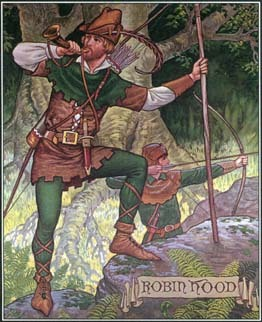
So let’s start with that. The myths around Robin Hood have grown over the years, most of which had the elements in there of him being a free spirited outlaw that was in Nottingham and being the enemy of the Sheriff came from earlier poems such as the Robin Hood and the Monk show that while he’s got some good in him, he’s not friends with the King, and that his robbing maybe more selfish, and the actions of the Merry Men are more in line with that of a thriller than the more epic adventure that we see later.
Robin’s stories changed over time from darker stories with thriller like plots, to comedic at times, and over time grew to show Robin changing from a character that simply robbed because of the fun of it, to someone who was robbing for the people, and that he could be outwitted by others and then they are invited to join with him.

Robin representing the lawful outlaw, the thief that while forceful to those that don’t fit into his moral code, can be gallant and kind to those that he finds right and just. He’s a Chaotic good type character in this case, leading into the Sheriff who falls under the idea of the dull witted idiot at times who get’s tricked and had by the clever robber. Over time Robin became a noble over a commoner, where as the Sheriff was always seen as part of the rich nobles that caused issue for the lower classes.
Thus a lot of the idea of the noble thief and the arrogant detective came into being. Though this dynamic wouldn’t stick around for long with these two as the Sheriff became more and more of a villain and Robin more of a heroic person who was only robbing to return the wealth to those that needed it.
Stories about Robin and his ways of stealing, namely their ballads, over time, influenced later writers who wrote about the exploits of real Highwaymen:
Later robber heroes included the Cavalier highwayman James Hind, the French-born gentleman highwayman Claude Du Vall, John Nevison, Dick Turpin, Sixteen String Jack, William Plunkett and his partner the "Gentleman Highwayman" James MacLaine, the Slovak Juraj Jánošík, and Indians including Kayamkulam Kochunni, Veerappan and Phoolan Devi.
These robbers were seen as heroic due to their bold actions robbing people face to face. A lot of the actions of later Gentle thieves can be attributed to the legends of these Highwaymens’ characters.

James Hind -Was a royalist who apparently helped other Royalist escape from troubles, gave money to poor royalists and also refused to rob cavaliers. A lot of his exploits were embellished, painting him as a Royalist Robin Hood.
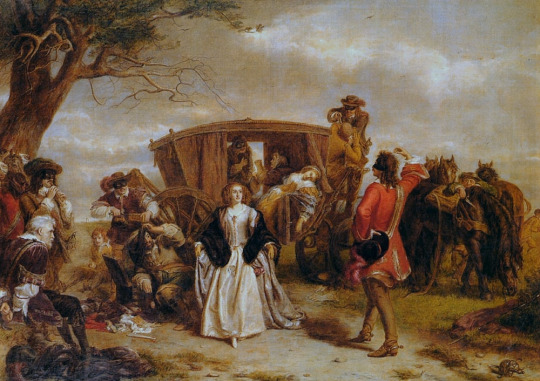
Claude Du Vall - According to popular legend, he abhorred violence, showing courtesy to his victims and chivalry to their womenfolk, thus spawning the myth of the romantic highwayman. -from Wikipedia. Du Vall is most known for inspiring a lot of the legends around the “Romantic Highwayman” legends.
John Nevison - with the nickname Swift Nick, due to a dash of 200 miles from Kent to York to create an alibi after a robbery, Nevison was known for never using violence against his victims, always polite, and only robbing the rich.
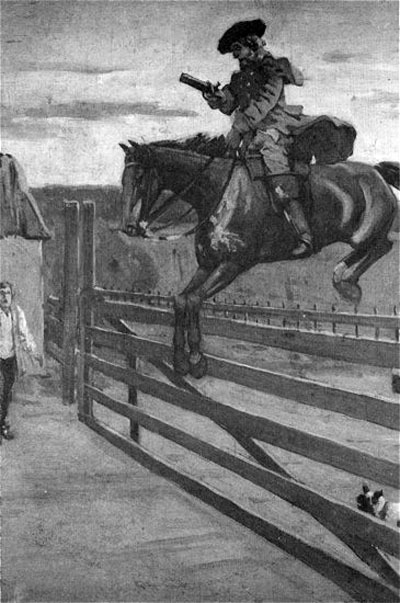
Dick Turpin - was nothing like his legend, and was over time turned into an almost robin hood like figure. The reason that his name is used so much and linked with the other gentlemen Highwaymen is due to the book Rookwood, where he’s used as part of the plot and comes off as far more lively than the mains.
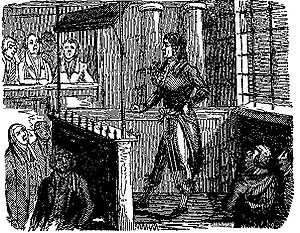
Sixteen String Jack - was known for his colorful costumes, wit and charm and typically robbed so he could afford said expensive clothing.
William Plunkett -wore a venetian mask and tended to be polite to women and only stole because he “was obliged to do so” not out of wontoness. He actually escaped with his life.

John MacLaine -a former son of clergy who became a grocer and, after his wife died three years after their marriage, went bankrupt and became the partner of William Plunkett. He, like Will, was seen a courteous and restrained when they were holding people up.
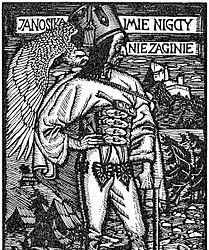
Juraj Jánošík -the Slovakian Robin Hood, who’s stories became more legend and was later used as a symbol against oppression. After helping another robber escape from jail, the two started a band, which Juraj became leader of at the age of 23, when the former leader left to settle down outside of the kingdom of Hungary. “ Most of their victims were rich merchants. Under Jánošík's leadership, the group was exceptionally chivalrous: They did not kill any of the robbed victims and even helped an accidentally injured priest.[5] They are also said to share their loot with the poor and this part of the legend may be based on the facts too.[5] -Wikipedia”
Kayamkulam Kochunni -is India’s Robin Hood. Like Juraj, Kayamkulam has become a legend and a bit of a deity as well. He was said to have robbed from the rich to give to the poor, focusing mostly on merchants that were wealthy. What’s interesting is that he’s one of the first to be well known and have a detective that is following him around, by the name of “ Arattupuzha Velayudha Panicker” who was a known warrior and defender of the oppressed, and who supposedly captured Kayamkulam, leading to him being placed in jail for a year where he died.
Veerappan -a more modern day version of Robin Hood in India, who was active in the late 1960s and into the early 2000s. Unlike the other members of this, he was not known for giving back to the poor, rather his status comes from the fact that he was elusive.

Phoolan Devi -a lady bandit who’s last name was used as a title for her. Her history in India was well known, and she later was released from jail after she and her gang were arrested for the massacre of a rival gang that had captured and raped her. However publically she was somewhat praised for her actions. She later was elected to the Indian parliament but was assassinated in 2001 by a former member of the gang that she had killed.
Other Highwaymen tended to do so for revolution or rebellion based actions, such as those in Ireland during the 17th to the 19th Century.
In 17th- through early-19th-century Ireland, acts of robbery were often part of a tradition of popular resistance to British colonial rule and settlement and Protestant domination. From the mid-17th century, bandits who harassed the British were known as tories (from Irish tóraiḋe, raider; tóraí in modern spelling). Later in the century, they became known as rapparees. Famous highwaymen included James Freney, Count Redmond O'Hanlon, Willy Brennan, and Jeremiah Grant.[10][11]
James Freney - originally lost his family lands in 1650, after being a well off family that was considered a noble. As a young man he wound up working as a servant to another well off family, married, and had a family. He joined with a gang after the towns fees caused him to close up his pub. Like a number of other Highwaymen he was known for being polite for the most part, and saw his actions as a way to get back at the English.
Count Redmond O’Hanlon - his family at one time was a favor of Queen Elizabeth the first, however due to them siding with the Catholics during the events of the Irish Rebellion, his family got their lands seized during the Act for Settlement, where in they lost all their status and lands to England and it was given away to other land holders. Redmond was known for being an excellent actor, mimic and persuasive speaker who used these skills. Again he’s seen as a bit of a Robin Hood figure.
Using this as a base we can see how these men and women of reality became a sort of base for fictional characters, who later became part of the genre of the Gentlemen thief. Furthering the evolution of these characters was the idea of the opposition of the thief in the form of the rival police officer, typically either a detective/cop/Agent of Interpol who has been sent out to stop the likes of the Heroic thief.
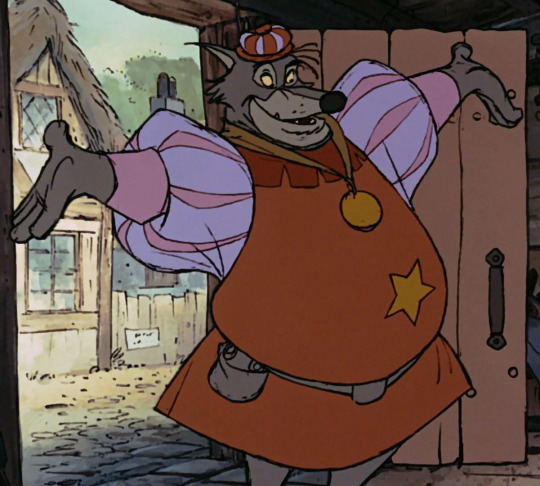
Subsequently, a change happened between the time of the Sheriff from Robin Hood to the time of someone like Zenigata, from Lupin the third. The first changes could be seen in the idea of making the opposite of the thief be someone that has a more personal reason to want to capture the thief, or have a more sympathic reason behind their being the rival to the thief.
Another aspect added to this was that, in some cases the detective had it wrong about the thief and their heroic actions were being read wrong by the law. Best example of this early on was is the character of Javert from Victor Hugo’s Les Mis. written back in the 1860s.

Javert’s story focuses a lot on how he wants to capture Jean because Jean ran from his parole, and Javert feels like he must catch him, even after years of the man reforming his life. One of the aspects about this that draws into the modern day Phantom Thief idea, is that of the character that at all costs, MUST, capture the thief. Javert devotes his life to it, dealing with the fact that he grew up inside a prison and can’t for the life of him deal with the idea that a criminal can change. This leads to his death, and the obsession of capturing Valjean.
The idea of the obsessive detective focusing their life on the chase digs into later day characters that are like Javert, but less suicidal.
The famous Scarlet Pimpernel deals with one such character. While the Pimpernel is no thief in the normal sense, he seeks to “steal” the lives of innocent nobles from the gallows during the french revolution.
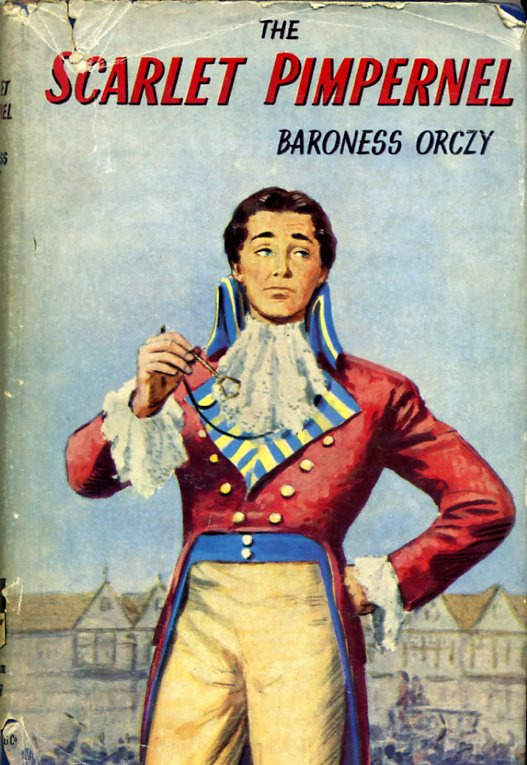
Created by Baroness Emma Orczy, Sir. Percy Blake is our lead (and shares with Carmen the love of Red) who through out the story plays up his foppish image to cover for the fact that he is the head of a ring of men and women who are covertly, under the black sky of the night, going to France to break out and save various people from death during the French Revolution. Blake is in a lot of ways the first user of the secret identity. But he also has a lot of the qualifications of being a Gentlemen Thief, including not harming people unless they attack first, and being ever so delightful to those he’s “robbing.” He’s a skilled fencer, an excellent actor, a master of disguise, an intuitive improvising and imaginative planner, and a quick on his feet escape artist.
Counter to him runs Citizen Armand Chauvelin, a cunning and ruthless man that is for the most part fearless and doesn’t care for his own safety -save where he figures that death is the only outcome of a situation. He’s highly intelligent and, in the past, was a close friend of Percy’s wife. During the stories we see him become the rival or counter to Sir. Percy, figuring out that the man is the Pimpernel but never having a chance to catch him, as Percy always eludes him, causing their conflict to keep dancing around all through the series.

Being the opposite of Percy, Armand plays up the darker aspects of the Agent. He’s shown wearing dark clothing, that he tends to brood more, and certainly while having some sense of mercy and sympathy, he feels that Percy should be stopped as he’s breaking the law in France. Much like Javert, Armand becomes slightly obsessed with capturing and outwitting Percy, but he never gets the chance to win.

This brings us to the idea of the inversion of the detective for the thief in the form of A.J. Raffles. Raffles was created by Sir. Arthur Conan-Doyle’s brother-in-law, E.W. Hornung, a poet and author. Raffles was created as a opposite to Holmes. Like Holmes there is a sharpness to his character’s look, though unlike Holmes, Raffles is far more of a social man and lives competing lives as a gentleman and a thief. It’s interesting to note that Doyle did not particularly like Raffles as he felt it was a slight to his character. Although of the two, Holmes has been used more frequently. Raffles also seems to share the whole “playing a role” to set up for his crime, but also feels that while he steals for himself, he tries to pick on people who can spare the theft.
This becomes important as later day thieves tended to play the part of hero and villain all in the same story in some cases.
The biggest and most well known though of all these Thieves and the most heavily inspired for western writers, is Arsene Lupin.

Pulling from Pierre Alexis Ponson du Terrail, Rocambole (an adventure hero that starts off as a thief like character and later became a heroic person), Arsene acts as a thief, stealing things that he deems worthy and always leaving some form of calling card to where he’s going to strike next. However he’s usually not the bad guy and the true villain of the story is far worse than he is. Lupin traditionally didn’t have a counter until his creator Maurice Leblanc decided to pit him against Sherlock Holmes (changed to Herlock Sholmes due to Doyle requesting it). This placed the two master minds against one another for several stories. Pairing them up in some cases to solve a crime or having Holmes go against Lupin to catch him and the other villain.

This pairing later lead to the creation of other characters that have bad guy like reputations but are really heroes, such as the Shadow, and Judex -from France (who probably inspired the Shadow).
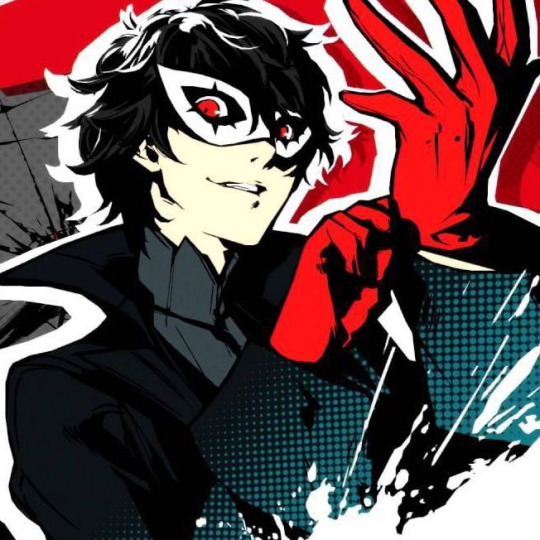
One of the Key elements to come from these thieves is that there is always a code of honor, which seems to stem all the way back from the days of the Highwaymen. This code seems to be:
Be charming, well mannered, and courteous to your target and others.
Avoid the idea of physical or emotional force or violence to steal
No intimidation when stealing
Only fight to defend yourself
Some thieves are already wealthy, others will take for material gain, but a good majority of them will steal not for wealth of money but for knowledge or appreciation of the object. A good number of modern thieves tend to steal things already stolen and return them to their rightful home, or correcting a moral wrong. In most cases it’s only from a wealthy or corrupt person, and only stealing one rare thing or as a challenge, typically leaving some sort of message saying they were going to take it. And once in a while they will give it back, because it was a “for fun” thing.
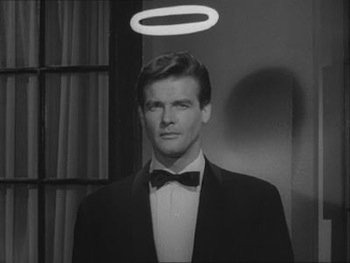
With the rise of other Gentlemen thieves in the west such as: The Saint, Thomas Crown, Jimmy Dale, Filibus, Danny Ocean, and various characters from comics (Gentleman Ghost, Catwoman, Penguin, Gambit, Black Cat) and many others, it doesn’t surprise me that Arsene Lupin became influential to Japanese writers.
Kaito Kid, Dark Mousy, Lupin the Third, and Saint Tail, all have their own opposing rival detectives, and each seem to steal in some way for good (save for those that also take for themselves).

Looking at Arsene Lupin III you have a similarity to the original character. someone who is mostly stealing for fun, but also he’s “ Acknowledged across the globe as the world's number one thief, Lupin is a master of disguise and deduction, marksman, and inventor of numerous handy gadgets. His fun-loving, foolhardy incongruity covers a brilliant mind always extemporizing and re-evaluating. As such, he has been responsible for heists no right-minded individual would believe possible. While occasionally arrested and jailed, typically by his ICPO nemesis Inspector Koichi Zenigata, he always succeeds in escaping unharmed.”
Lupin’s personality over the years has changed as the various versions of the anime has over time cooled his harder edges and made him more of a chivalrous goofball, who can get away with things. In some cases he’s doing it for the thrill, but in several situations from the anime and movies he tends to do it because he wants to do the right thing, and maybe earn some side cash. In any event in the anime he’s not without his side kicks, and of course there’s Zenigata.

Monkey Punch, the creator of Lupin the Third said that Koichi Zenigata and Lupin have a Tom and Jerry aspect to them, and the only way the series will end is when they are equals. Either they both lose, they both win, or they both retire. Zenigata is more in line with the idea of the detective following a life long passion. He is, much like Armand and Javert, obsessed with capturing Lupin and has shown over various shows that he cares for the younger thief.
The origin of Zenigata's and Lupin's mutual regard was based early in the series when Lupin had the chance to shoot the Inspector, but instead wished him well and escaped. Since then, an unwritten understanding exists between the pair where neither will attempt to cause the death of the other. Further, the two are best referred as unacknowledged friends; several occasions have occurred where Lupin and gang aided Zenigata out of a life-threatening situation. When a woman the Inspector loved was killed by a criminal gang, Lupin participated in avenging her murder. And when an old enemy of Lupin's shot Zenigata point blank while he helplessly watched, a wild motorcycle chase began to apprehend the killer, partly for Lupin to conclude affairs with the adversary, partly to avenge the (supposed) death of the Inspector.
On the other end for the pairing you have the Kaito Kid and Detective Conan.
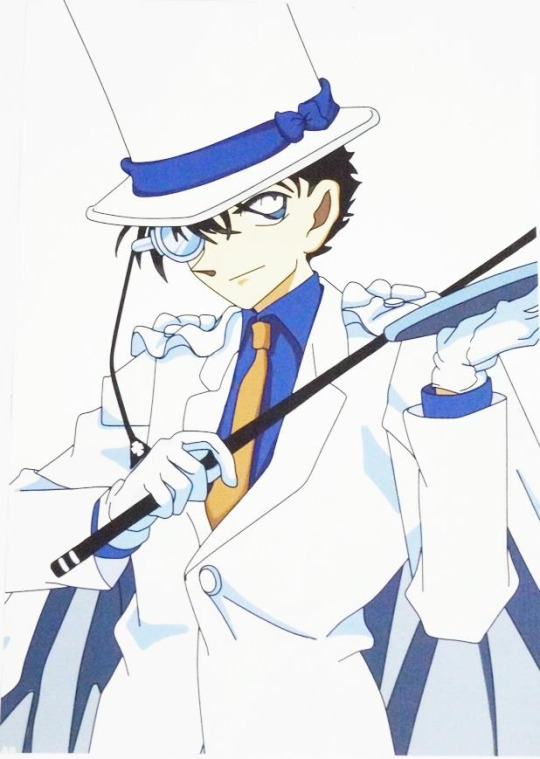
Now unlike Lupin who steals because it’s his way of life, Kaito Kid (aka Kaito Kuroba -yes that is his real name) does so to follow up on his family legacy and try to find the men that killed his father. The reason he steals isn’t for money or for fixing issues, no this is more of a personal thing. After taking the gemstones Kaito tests to see if they, under the moonlight, to see if the Pandora gem (a stone that has the ability to grant immortality) is inside for the express purpose of destroying it and keeping it from the hands of the organization that killed his dad. When he takes the stones, or any treasure he typically leaves a calling card, so the bad guys know what he’s going after so he can confront them, and later returns the items to their places.
Kaito doesn’t have an exact opposition, but normally if he is a bit of an antagonist in a story, that role goes to Detective Conan (aka Jimmy Kudo). Sometimes Conan is out to stop him from stealing something, but a number of times the two have teamed up as the organization that killed Kaito’s father was also connected to Jimmy becoming a small boy from a teenager. Kaito has played Jimmy from time to time, confusing friends and enemies for the young detective and also helping out when Lupin III showed up for his own heist in a movie. Jimmy though knows who Kaito is, yet he can’t pin any crimes on him.

The interesting thing about their conflict is that while Jimmy wants to stop him, he also knows that there’s more to Kaito’s actions than just being a thief, so unlike where Zenigata legitimately wants Lupin to reform, Jimmy knows that once Kaito finishes what he needs to do he’s likely going to stop being a thief, thus, while the chase is fun, unlike with Richard (the detective that Jimmy tends to knock out in order to explain the case) who sees Kaito as a thief, Jimmy knows that it will end and that in the end no one’s going to be hurt save the bad guys that killed Kaito’s father.
On the other side of things where in you have this idea of a pairing that has magic, you have Dark Mousey/ Daisuke Niwa and Krad/Satoshi Hiwatari.

Where as with Kaito who uses tricks to preform magic, Dark/Daisuke actually uses real magic to pretty much create a situation that has a lot of real magic in their thefts. See in the case of D.N.Angel, the story actually revolves around a curse. Dark is a being that may, or may not, have been a real person at some point in time. He is part of Daisuke, a middle-schooler who’s family has this curse placed upon them, where the first born son will inherent Dark and become a thief. The goal, to steal items that have a magical curse that was created by the Hikari family. Long story short if Dark and Daisuke fall for the same girl then Dark goes away from Daisuke and he waits till the next person or the curse is lifted (I can’t remember because last I read they were liking two different twin sisters, and keep switching who likes who.)

Opposing Daisuke is Satoshi Hiwatari, who is actually the adopted son of the Police Chief and the heir to Krad, Dark’s opposite. He has little control on Krad and is the descendant of the man who made the cursed items. Satoshi cares a lot for Daisuke seeing him as a friend and wanting him to stop using Dark, but the fact is that it’s not a possibility until the curse is broken for both. Both boy’s have their “specials” (I don’t know what they’re called) come out when they react to emotions. Daisuke is to feelings of love from a special girl that he likes, and Satoshi has it when Dark comes out and there’s a sense of challenge coming from Krad.
The thing that’s interesting with this cat and mouse game is that Daisuke and Sataoshi general want to be friends, with Satoshi being the cold character to Daisuke’s more warm and genuine personality. While Satoshi wants to stop Dark from stealing thing, Daisuke wants to find a way to release Dark and Satoshi from the curse that’s upon them because he knows Krad is hurting his friend. The point of the thefts though comes down not to robbing the rich, nor returning something for justice but for the sake of canceling out something dangerous in human hands. The idea that the art piece is cursed by an emotion and that the feelings of that piece need to be fixed, usually something to do with love and sadness and that sort of thing.

Similarly in the actual magical thief department we have the character of Meimi Haneoka aka Kaitō Saint Tail or just Saint Tail in English. Like another magical girl thief Phantom Thief Jeanne, there are aspects of the magic girl series here. However unlike PTJ, Saint Tail deals more with the actions of actually stealing art rather than cleansing it and making it vanish. The difference here is that unlike Jeanne, Meimi is just using stage magic, much like Kaito Kid, so her actions are done with her own wit and guile. What’s interesting is that unlike the other thieves mentioned, Saint Tail is a thief that takes back what has been stolen.
Meimi’s goal is helping those who have had things taken from them or ease their troubled hearts, as her friend who is a nun in training gets to hear these issues and goes to ask Saint Tail for help in taking back what was stolen. Meimi, like the others above, has a rival detective in the form of Daiki Asuka who is also a classmate of her’s whom she classes with as he’s obsessed with catching Saint Tail.
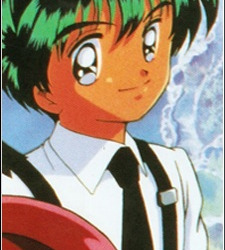
What’s interesting about this set up here is that unlike all the others, where it’s male vs. male, this is male vs. female and, because it is a shojo series, there’s a romantic undertone to this story. Daiki, for his part, does seem to have a bit of a crush on Saint Tail but ultimately wants to bring her to justice, and in Saint Tail form Meimi does flirt with him. However the conflict comes down to the idea of her and Daiki not seeing eye to eye in their civilian lives, as Meimi has a bit of a tsudare sort of mask so that others don’t know she’s Saint Tail. Thus the two butt heads a lot, as both are stubborn, and Meimi is constantly grappling with her own jealousy for her alter ego having Daiki’s heart.
It’s not that often that you see this set up with the Detective and the thief eventually ending up as a couple (Yes this is a spoiler) since in most cases the thief usually has a side love interest that has nothing to do with his or her crime career (either the person is doing an alter ego thing, or the love interest doesn’t pay mind to their crimes) or they are working with them on their criminal sprees.

This means that Daiki and Meimi are a bit of a rare pairing, the only other one that springs to mind is Batman and Catwoman (though that has it’s own issues) and Sly Cooper and Carmelita Fox from the Sly Cooper games. However their cat and mouse game mirrors a lot of other Detectives and thieves. For Daiki the idea of catching Saint Tail means that he can prove himself to his dad who could never catch the “Fallen Angel” thief, who happened to be Meimi’s mom, and he feels that if he can catch her than it makes up for his dad not getting Fallen Angel. It’s interesting too that, as with Kaito Kid, Dark Mousey and Lupin III, Saint Tail leaves calling cards but with different reasons. Where as with Kaito it’s to lure out the villains who killed his dad, and Dark as a PR thing for Satoshi, or Lupin just to annoy Zenigata, Tail’s game is so that Daiki and the cops can arrest the person that stole the object in the first place and get them proof so that they will go to jail for their crime.
It makes their relationship far more complex than your traditional thief and detective.
The thing is that the role these two play opposing one another is a game of cat and mouse that is designed to thrill the audience. Viewers watch, or readers read, as the characters have to outwit one another. The thief must always be one step ahead of the detective. But never too far ahead, and the detective must always be one step behind but know the truth even if they can’t prove it.
This leads to some interesting dynamics in regard to the idea of the thieves that don’t steal for their own goal. While it does, at times, make the detective question if they are doing right by chasing them, the thief needs to always reaffirm to the detective that they should try to catch them. The thrill is in the chase for the thief too, and in some cases it is not just the fun that is being had, but also the goal in allowing the detective to become a friend and in some ways a companion to the thief.
Without the detective doing the chasing the challenge isn’t there, and, on top of that in the case of a robin hood like thief where they want the police to capture a worse criminal, then they feel like they are actually doing some law abiding things as well. In other cases, they only agree to give up to that detective or rival, and will only become lawful again once their mission is completed, or they feel like the two are then equals.
Part of the game for the gentleman or Lady Thief is that they will show a great deal of compassion for those that they are taking from in some cases, and also feel the same for the detective. In a few cases, as with Lupin and Sherlock/Conan, there’s a sense of admiration and appreciation for each other’s skills and intelligence. Or in other cases as with Sly and Carmelita or Tail and Daiki, there is genuine love and affection there that leads to romance.
It’s the sense of almost flirting and a chance to change the other persons view of the world. In a lot of cases the detectives can see the good in a person, as with Zenigata regarding Lupin, but also they know that what they are doing in in the wrong according to the law, and they want that person who could be an amazing good guy and ally to them to join them on the lawful side of things, rather than the chaotic good side.
So how does this all fit into Carmen and the others? Well this has gone on too long I think, so I’m gonna do that as a part 2.
#carmen sandiego#carmen sandeigo 2019#robin hood#phantom theif#gentleman theif#d.n.angel#dark mousy#daisuke niwa#satoshi hiwatari#krad#lupin iii#lupin the third#lupin the 3rd#arsene lupin#sherlock holmes#kaito kid#case closed#jimmy kudo#scarlet pimpernel#Les Miserables#a.j.raffles#saint tail#meimi haneoka#daiki asuka#inspector zenigata#koichi zenigata#sir percy blakeney
165 notes
·
View notes
Text
The Blue & Orange Morality of the White Lion and the Life Givers of Oriande
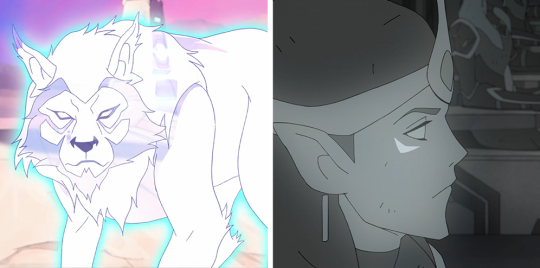
Prompted by an Ask, this very long post examines the White Lion and its condition for obtaining the knowledge of Altean Alchemy.
“Hi! I can't stop thinking about White Lion. Why is the condition for obtaining the knowledge so stupid? Give up your life? If anything, Allura wanted that knowledge for personal reasons (being Altean, father's daughter etc.), while Lotor went there with a purpose—he needed that knowledge so his own “Voltrons” would work with Alteans from Colony. It seems natural to fight, when lives of people depend on your success. And how did Haggar get that knowledge?”
My answer as to these questions—especially the White Lion and its condition for obtaining knowledge—is to deep dive into some meta and analysis by:
Skimming some literary and mythological concepts that relate to the Life Givers of Oriande and the White Lion via the basics of the Quest for Secret & Sacred Knowledge
Comparing VLD and the Prometheus and Alien: Covenant films where this quest appears
Exploring the requirements for entry to Oriande and the price of obtaining Secret & Sacred Knowledge in VLD
And how that applies to Lotor, Allura, Haggar, and Alfor
First, some context: There is a Reason™ why certain tropes, and certain types of plot lines, and certain types of character arcs are bundled together and progress in certain ways. These combinations are Timeless. Generally speaking, they work well so long as one follows the unwritten rules that bind them together. Their predictability can be offset by a skilled and clever writer. These combinations are the building blocks of Ur Stories, and many Ur Stories (and their contemporaries) involve Quests for Secret & Sacred Knowledge.
The White Lion’s strange condition for obtaining knowledge is one found in many such stories, told in myriad ways, and is one of the oldest concepts in human story-telling, hence why it almost always appears bundled with certain tropes, plot lines, character arcs, etc.
From Odin’s unyielding quest for knowledge and willingness to pay any price for it, to Prometheus’ defiance of the Gods to give mortals the Gift of Fire, to Victor Frankenstein’s ‘dangerous pursuit of knowledge’ resulting in the tragic creation of a monster, to Enkidu’s tryst with Shamhat leaving his physical prowess diminished but his mind expanded, and throughout many more such stories; the following theme emerges: When knowledge is gained, something is lost.
The loss can be intentional (e.g. sacrifice) or unintentional (e.g. consequences).
In many stories with a similar setup, the White Lion and the Life Givers of Oriande would be a case of Blue & Orange Morality (this is not the same as being “morally gray”). In these kinds of stories, the Keepers of Knowledge often judge worthiness in a completely different way from that of the Knowledge Seeker, and they may even be pulling the strings for their own purposes that are incomprehensible to those who seek their knowledge. Their requirements for the gift of knowledge fulfills their own morality, and one to which they adhere, but that morality has little resemblance to what a Seeker of Knowledge may believe in…unless that Seeker learned their ways and began to practice them.
The Secret & Sacred Knowledge is for the taking by whomever is willing to pay the price, meaning that even the most vile and evil being that ever lived could gain the Knowledge for their own use. Thus the Keepers of Knowledge are not bound by a morality that would require them to prevent access by the evil and wicked. The only time the Keepers will care (e.g. divine retribution of some kind) is when the rules for gaining or using that knowledge are broken or some line is crossed by a prideful mortal. While there are stories where the morality of Keepers of Knowledge align with a general black-and-white morality of good and evil, Oriande and associated Altean-related concepts (not to mention, the Voltron lions) do not consistently give off the usual and unambiguous signals of black-and-white (e.g. good vs evil) morality.
Part I: Breaking the Keeper's Rules (two examples).
The titan Prometheus’ punishment for defying the Keepers (e.g. Zeus and the gods) is to be bound to a rock for an eternity as an eagle eats his constantly regenerating liver each day; and
Victor Frankenstein has no deity to punish him for his God-defying scientific experiments, but tragedy finds him anyway.
In both of these examples, the knowledge gained came with a heavy and tragic price.
In example of Prometheus, (there are several versions) he is moved by the plight of mortals, their hard lives could be made better with the Gift of Fire (e.g. Knowledge), a gift that is jealously guarded by Zeus and the gods on Mt. Olympus. In some versions, the mortals already had the Gift of Fire, but Zeus took it from them out of anger of a trick played by Prometheus which benefitted the mortals in the form of sacrificial offerings. Either way, Zeus and the gods have a Blue & Orange morality. Prometheus’ intentions were noble and good, but his means via trickery broke the arbitrary rules of the gods (e.g. the Keepers of Knowledge). Why would the gods withhold this gift if it could do good? Because in the wrong hands, Fire can be weaponized and used for destruction. Remember that because we’ll return to this as VLD gives us a subtle Promethean character arc.
In the example of Victor Frankenstein—from Mary Shelley’s “Frankenstein; or The Modern Prometheus”—he takes his obsessive pursuit of knowledge, the secrets of life and death, too far in the name of science. He realizes too late the horror that he has created, and abandons his creation (the monster that is erroneously called Frankenstein outside of the story). Frankenstein's monster gradually destroys his life by murdering friends and family, even framing him for it. Shelley’s use of “The Modern Prometheus” as the subtitle of her novel intentionally invokes the myth of Prometheus and the divine retribution he suffered for his transgression against the Keepers of Knowledge. The punishment delivered to Frankenstein is a strange kind of black-and-white morality, as it is the price paid for transgressing Natural Law through science. One could call it “natural retribution” in absence of the divine. Here, the Keeper of Knowledge is simply Nature itself.
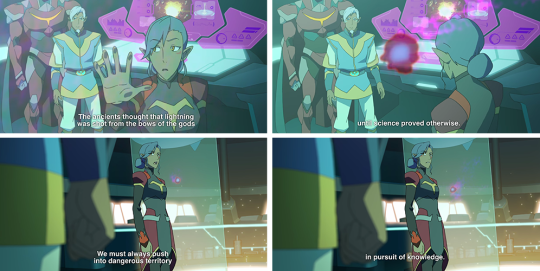
Above, Honvera rebukes Alfor’s caution: “The ancients thought that lightning was shot from the bows of the gods until science proved otherwise. We must always push into dangerous territory in pursuit of knowledge.”
In VLD, Honerva’s Frankenstein-like obsession with quintessence, and her willingness to push further—to break natural boundaries in pursuit of knowledge—is her undoing. Honerva’s tragedy does not stop with herself and her family, as the price of knowledge gained is paid for by the entire universe for 10,000 years.
Part II: The Quest for Secret & Sacred Knowledge In Space.
In Season 5 of VLD, the basic template of a Quest for Secret & Sacred Knowledge appears in the form of the journey to Oriande. The same basic quest template also appears in the Prometheus and Alien: Covenant films.
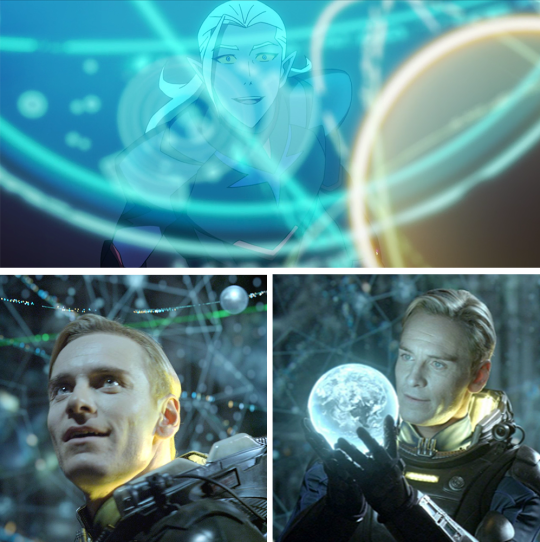
Above, a summary: A pretty, well-spoken, ageless, pale-haired man with a British accent is used-and-emotionally-neglected by his powerful father whom he grows to despise and is treated badly and distrusted by his father’s kind. The father is prideful and has a bit of god complex. After his father’s well-deserved death, the man embarks upon a Quest of Secret & Sacred Knowledge held in a far-off utopia guarded and/or inhabited by Ancient Keepers of Knowledge. His companion to this utopia is his love interest, a petite and well-spoken woman with a British accent who is stronger than she looks, and is instrumental to finding the star map that initiates the quest to begin with. The sought-after secret knowledge has themes of life and creation. These secrets are yielded through life sacrifice and prove to be dangerous in the wrong hands.
I’m not saying that VLD ripped off Prometheus and Alien: Covenant but here we are...
The starting premise of Prometheus is that an exploration mission to planet LV-223 is organized by Peter Weyland, an old and dying CEO who bankrupts his corporation to pay for this mission. He is desperate to find humanity’s creators—called “Engineers” by Elizabeth Shaw and Charlie Holloway—firm in the belief that they will grant him immortality. The location of LV-223 is revealed through the discoveries of star maps in the form of cave drawings by Shaw and Holloway.

Above: Upon arrival to LV-223, the crew discovers a temple and within it are urns containing a mysterious black goo, as well as long dead remains of some Engineers. They quickly discover that this black goo has strange and unexpected properties. It doesn’t go well for them, after all, this is the prequel to the Alien franchise.
youtube
Above, content warning: None. The video clip above shows the discovery of the mysterious urns within the Engineer temple.
So we’ve got cave drawings that function as a star map, a temple constructed by ancient creators keeping the secrets of life, and a mysterious substance that can create powerful monsters via its transmutational properties.
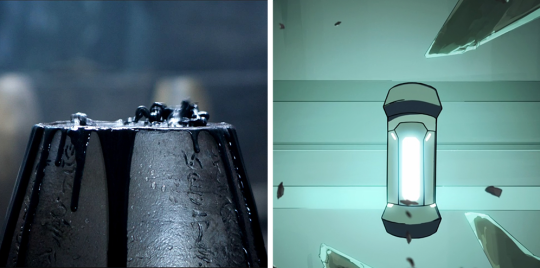
Above: in addition to being an unobtanium power source, some forms of quintessence can have transmutational properties as with the black goo in Prometheus.
Below: a xenomorph derived from a chain of gradual evolutions that began with the black goo and an unlucky victim, and Ranveig’s super weapon, the horror- monster-esque result of experiments with the strange quintessence.

In both Prometheus and Alien: Covenant, this black goo—called “Chemical A0-3959X.91 – 15”—is a weaponized mutagenic pathogen that delivers a modern sci-fi twist on transmutational alchemy and transformation potions. Chemical A0-3959X.91 – 15 evolves non-botanical life, by first destroying it, and then creating something new out of that which it comes into contact.
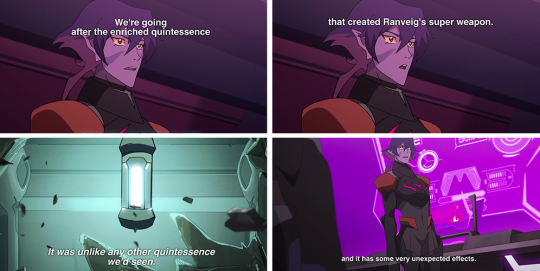
Above: Krolia tells Keith about the quintessence that the BoM have been tracking (two separate scenes). “We’re going after the enriched quintessence that created Ranveig’s super weapon. [...] It was unlike any other quintessence we’d seen. [...] and it has some very unexpected effects.”
How strangely familiar all of this is! Let’s continue.
The Engineers, creators of human life, and their morality:
Throughout Prometheus, the Engineers—the Ancient Keepers of Knowledge—are revealed to embody a Blue & Orange Morality and are the creators of human life (among others) and they sometimes return to judge their creations.

Above: An Engineer asks, “Why does he [Weyland] want more life? What makes this man so great as to ask such a thing?”
youtube
Above, content warning: Video clip of extended/deleted scene where David 8 speaks with an Engineer and Weyland asks for immortality. There is a quick decapitation (bloodless because David 8 is a Synthetic) and some quick impact deaths. No gore. Use the YouTube gear/settings icon to turn on subtitles to see what the Engineer is saying.
Addition/Edit: The video clip above doesn’t link anymore and Tumblr wont’ let me add another video, so here’s the URL until I can re-edit this properly to fix it.
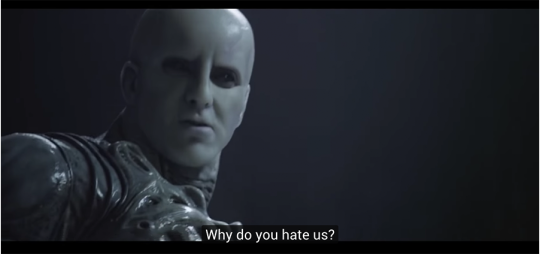
Above: the Engineer directs his cold stare at Elizabeth Shaw who wants answers as to why they were lured to LV-223 to find the weaponized pathogen. She asks “Why do you hate us?”
The Engineers created humanity and have a detached will to wipe the slate clean and start all over again, sacrificing their own lives in the act of new creation. Within their their beliefs and morality, creation and destruction are intertwined. It is death that begets life. What Elizabeth Shaw sees as hate, is just the Engineers’ way of perfecting their own flawed creations. Nothing personal.
The morality of the Engineers later corrupts David 8 (who was already morally gray) during his years of studying them, as he learns their ways during The Crossing, which takes place between Prometheus and Alien: Covenant.
Below: David 8 and Elizabeth Shaw operate the navigation system of the Engineer’s ship in The Crossing.
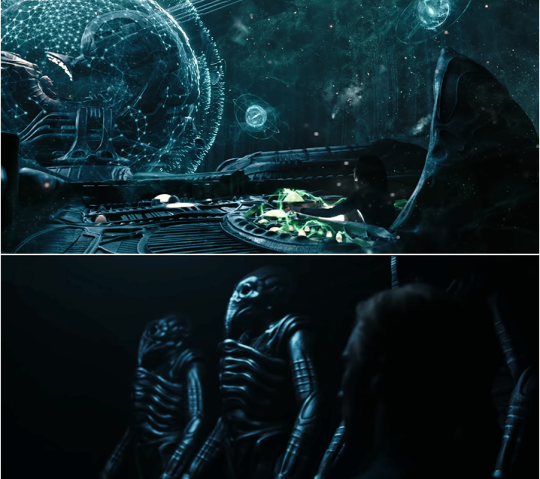
Above: after Shaw is put to sleep in a cryobed, David 8 is left alone to study the Engineers for the remainder of their journey. When they arrive, he has learned their ways and has come to a grim decision of what to do with their weaponized mutagenic pathogen.
youtube
Above content warning: None. This promo video ends just before David 8 unleashes the Engineers’ own weapon against them upon his arrival to their utopia.
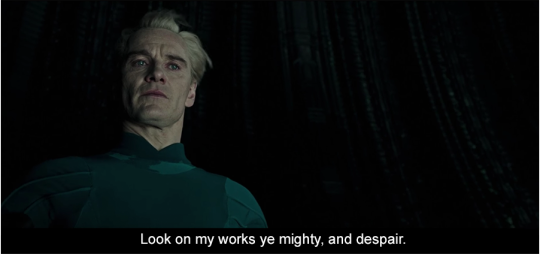
Above: If y’all thought Lotor was dramatic... David 8 overlooks the destruction and cries while reciting a line from Ozymandias. “Look on my works ye mighty, and despair.”
Below, content warning: Video clip with body horror and abstract gore, slightly obscured by dim lighting and desaturated colors during David 8’s destruction of the Engineers.
youtube
As these video clips and images show, the ways of the Engineers—their philosophy and morality—lead David 8 into crossing the Moral Event Horizon. He becomes both a God-Slayer (destruction of the Engineers) and a Creator of Life (cultivation and creation of the Xenomorphs).
About mid-way through Alien: Covenant, David 8 is revealed to have betrayed the person he loved, Elizabeth Shaw, by using her for organ harvesting. The harvesting was necessary for the creation and cultivated evolution of the perfect life-form: the Xenomorph (I’ll spare y’all the images of that).
Through his mastery of the Engineers' knowledge, David 8 becomes the Greater Scope Villain of the Alien franchise. His story is one of triumph. He wins against those who wronged him, against the father that used him and considered him soul-less (thus less than a human), against the humans that created him to be used, and against the Engineers that created a humanity that he sees as unworthy of the gift of creation in the first place. A gift denied to David 8 because he is a Synthetic. All it cost David 8 to gain this gift of knowledge was the sacrifice of the only person who was kind to him (and possibly loved him, that's unclear).
The loss-and-sacrifice of Shaw fulfills the Sacred Knowledge Quest rule that: when knowledge is gained, something is lost.

Above: an Engineer uses the black goo to transmute his own body in order to seed non-botanical life on Earth.
The off-screen sacrifice of Shaw’s life echoes the beginnings of human life shown in the opening of Prometheus where an Engineer seeds life on Earth by sacrificing himself via the pseudo-alchemical transmutation of his own body.
youtube
Above content warning: Abstractly graphic. Not bloody, but the Engineer’s body is slowly disintegrated while being transmuted by the black goo. No gore.
An eerily similar Quest for Sacred & Secret Knowledge mixed with horror appears in VLD, spread out between Lotor’s actions prior to the start of the series, the journey to Oriande in Season 5, and the events in Season 6.
The Life Givers and Altean Alchemy:

In VLD, the Keepers of the Secret & Sacred Knowledge of Altean Alchemy are called the “Life Givers” by Lotor, and the “Sages” by Allura. As shown in the image above, they are described by Lotor as “the first Alteans to unlock the secrets of Oriande, the beginning of Altean Alchemy.”
One of them—presumably a Life Giver—is later shown without corporeal form when speaking with Allura after she passes the White Lion’s trial. Allura is told that she is in the realm of her ancestors—the Alteans and Life Givers—implying that she is one of them for she is “home”.
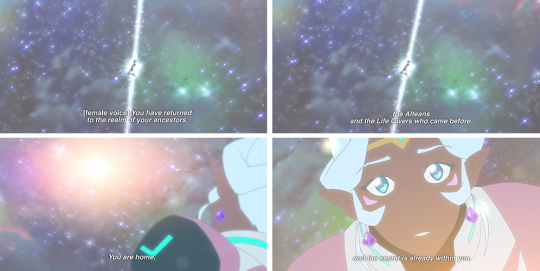
Above: the cosmic voice tells Allura “You have returned to the realm of your ancestors, the Alteans and the Life Givers who came before. [...] You are home, and the secret is already within you.”
For those keeping score: Life Givers = Engineers.
The morality of the Life Givers is unclear as story events—and the aforementioned bundle of Timeless tropes and concepts—suggest Blue & Orange morality, while the implied traits and other in-story associations thus far (ahead of S8) with the Alteans and Alfor suggest that the Life Givers of Oriande embody a morality of Perfectly Good Pureness in opposition to the Galra’s presumed Horribly Evil Darkness. It’s upon examining the actions and beliefs of the Alteans—and thus the Life Givers—that a superficial black-and-white morality starts to give way to a Blue & Orange morality that is incomprehensible in various ways (e.g. the White Lion’s strange condition for obtaining knowledge).
Like David 8, Lotor learns of the Life Givers’ ways prior to arrival at the utopia, only in his case, he does so without realizing it and his understanding is warped by being raised in the Galran belief system. Here, their ways—to give of one’s life, and/or that life must be sacrificed to obtain knowledge—are associated with the Alteans and Lotor's study of Alfor’s work, Altean culture, artifacts, and ancient drawings (until the story unambiguously shows otherwise). Unlike David 8, Lotor’s sacrifice and quintessence harvesting of those who loved-and-worshipped him occurs before entering the utopia (if the events described by Romelle are true). Also, unlike David 8, Lotor’s story is not one of triumph against those who wronged him and others, but like David 8, Lotor was on the path to attaining something greater than his nature would have otherwise allowed.

Above: David 8 delights in the unexpected unlocking of the Engineer’s star map, and both Lotor and Allura are shown the same way when Allura unlocks the star map to Oriande from the compass stone.
In both Prometheus and VLD, the clues to the location of the utopia comes from a combination of ancient cave drawings and navigation devices left behind. These clues form star maps and the like, but are mostly unusable until they are unlocked, by David 8 in Prometheus, and Allura in VLD. As shown above, their respective unlocking and reveals are very similar.
The big difference here is that in Prometheus, there are two star maps: (1) the initial star map—derived from cave drawing to reveal the location of planet LV-223—is discovered and deciphered by Elizabeth Shaw and Charlie Holloway; and (2) the star map in the navigation room that reveals the location of the Engineer’s home world (a utopia called ‘paradise’ in their language). Thus, in Prometheus, the Quest for Secret & Sacred Knowledge is divided into two parts, with the second part to be completed prior to Alien: Covenant in The Crossing.

Above: that’s one hell of a mouth on these monsters (Hammerpede and Deacon from Prometheus, and Ranveig’s super weapon from VLD).
Given how closely Oriande and Lotor’s role in that part of VLD’s story parallels David 8’s in Prometheus, I would not be surprised if Ranveig’s Super Weapon was informed by Xenomorphs, especially since the transmutational properties of the black goo would find a correlation in the strange effects of the quintessence found by Ranveig.

Above: Allura passes the White Lion’s trial by being non-violent and speaking to its philosopy. “I seek the secret of life. I give my own.”
For Allura’s part, unlike Shaw, she survives the Quest for Secret & Sacred Knowledge. Her willingness to self-sacrifice during the White Lion's trial, for the sake of knowledge, relates to Shaw’s unwilling sacrifice in Prometheus. Both sacrifices lead to knowledge. Allura for her own gain (in addition to Lotor’s), and Shaw for David’s gain.
The key here is that both stories demand a sacrifice of life for knowledge, and the knowledge obtained has to do with the power of creation and life with alchemical themes (transmutational).
That’s heavy stuff. It’s mythic level. These are themes found throughout humanity’s oldest stories, myths, and religions. It’s the stuff of Warring Gods, Capricious Fair Folk, Geas and Mystic Debts, and Divine Retribution, and Tragic Fates.
Which brings us back to Anon’s question about the White Lion:
“Why is the condition for obtaining the knowledge so stupid? Give up your life?”
Superficially, the White Lion is just another DotU reference. There’s nothing deep or meaningful about it on its own.
Thematically, the White Lion’s Trial is similar to the Blade of Marmora’s Trial. The BoM’s creed “Knowledge or Death” is informed by the Galra creed “Victory or Death”, both of which are contrasted by Allura’s words to the White Lion: “I give my own [life].”
It’s most likely that’s all there really is to the White Lion and Oriande, and thus there is nothing else here to dig at as far as the story is concerned. “Give up your life” for knowledge is merely a part of the aforementioned package of Timeless tropes and concepts that are frequently found in Quests for Secret & Sacred Knowledge and other Ur Stories.
But for the sake of meta, I’ll pretend that there is more to the White Lion and the Life Givers of Oriande.
To recap: within the context of Ur Stories, the White Lion and the Life Givers of Oriande are Keepers of Knowledge. The White Lion is the kind bound by some form of morality that dictates who gets access and how it tests those who seek it, while the Life Givers bestow it. Prometheus and Alien: Covenant are a recent example of this kind of story, and a similar tale plays out in VLD.
Part III: The Case for Blue & Orange Morality.
From the start, the White Lion’s requirements have their bias in Altean-ness, but not just any Altean-ness. A “worthy” Altean. Given that Alfor, Lotor, Allura, and Haggar were all worthy to enter Oriande, their past actions or goals/desires were less important, or not even a consideration. Thus, worthy Altean-ness is arbitrary from the outside, but must suit the Blue & Orange morality of the White Lion in some way. Additionally, only the worthy can pilot the lions of Voltron (depending upon where we are in the series and when the requirement lore is discussed or retconned), and yet none of them could enter Oriande. Why is that? What made Lotor—a half-Altean who Did Bad Things™—more worthy than Lance who was chosen to be the paladin of two different Lions? This arbitrary worthiness contradicts the symbolism of the Guardian being a “White Lion” that ties it to Voltron (and possibly the Lion Goddess worship of the Arusians). Such contradictions are reasonable to expect out of Blue & Orange morality.
However, if the White Lion and Oriande were meant to embody the Perfectly Good Pureness of the Alteans, then that raises a lot of questions about why Lotor and Haggar were able to enter while the paladins were not. While Haggar is shown to be using her magic, and possibly over-powering the White Lion and the Life Givers, I’ll explain why that might not be the case. Alternatively, this contradiction reveals a huge plot hole.
In the case of Blue & Orange morality, anyone being allowed to enter is questionable, as typically, Powerful Eternal Entities Protecting Sacred Knowledge who adhere to Blue & Orange morality often have their own motivations, plans, goals, etc that involve the use of the Knowledge Seeker in some way. In other words, the White Lion and the Life Givers may have their own agenda, and any who enter Oriande are at risk of being used to further it (either knowingly, unknowingly, cooperatively, or uncooperatively).
Oriande calls back to those Ur Stories, because one doesn't set up Blue & Orange morality behind a Quest for Secret & Sacred Knowledge in a setting like VLD without a plot twist revealing Something to embody that morality as an obstacle to the protagonists at the 11th Hour (if consistency in world-building and adherence to genre conventions were to apply). Thus, we are looking at Playthings of the Gods, or a Greater Scope Villain scenario that has something to do with Oriande. This also means that at least one of these four: Alfor, Lotor, Allura, and Haggar, were lured to Oriande for the purpose of Something Else.

Above: Haggar emerges from the temple, sparkling with divine purpose, and is restored as Honerva.
Haggar’s restoration into Honerva all but seals Blue & Orange morality for me. She got a huge pay-off from Oriande, and from the protagonist-centered morality PoV, she was the least worthy to enter, and so far appears to have paid no price. Additionally, in some stories with Blue & Orange morality, Haggar’s 10k years of reaping quintessence from the destruction of planets (and every living thing) would be seen as a necessary process to maintain the balance of creation. As in Prometheus, Death begets Life.
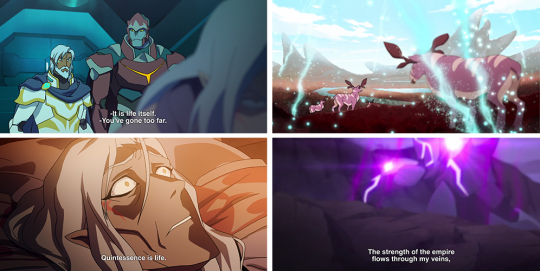
Above: Honerva equates quintessence with life twice in The Legend Begins. The Komar is used to reap quintessence from a planet in Taking Flight. And when Zarkon powers himself up during his fight with Lotor in Blood Duel, he does so with the quintessence that has been collected for the use of the Empire.
Thus, when Zarkon says “the strength of the Empire flows through my veins” he means that literally and symbolically. He is made stronger through all of the life energy reaped within his empire, every living thing which has died is within him. Through Honerva’s work, Death begets Life (a cursed life perhaps, but life all the same).
Why Perfectly Good Pureness doesn’t work:
If the White Lion and Oriande were meant to embody Perfectly Good Pureness, then that makes the entrance of Haggar and Lotor highly questionable.
Either that’s flawed writing, or there is something else is going on that’s not adding up:
Lotor is revealed to have harvested quintessence from Alteans (which may not be the full story), and Altean-ness is a pre-requisite to enter Oriande, and Allura is Altean while Lotor is half-Altean. But Allura is also implied to be a Life Giver and that Oriande is her home, meaning that the Life Givers and Altean-ness are closely-related. If what Romelle said about Lotor was true, by any stretch of Perfectly Good Pureness morality, the White Lion should not have given Lotor the all-clear signal in the form of Marks of the Chosen due to Lotor's past sin of evil acts against Alteans. So either his past with the Alteans at the Colony do not qualify as evil (which contradicts Perfectly Good Pureness), or those actions didn’t happen in the way that Romelle described them.
If Lotor wouldn’t have been worthy to enter Oriande due to his past actions, then that could mean that he was allowed to enter for the sake of having brought Allura there, his failure of the White Lion’s Trial foreseen and thus no risk of him gaining the sacred knowledge. This means that he was used by the Life Givers to serve their purpose.
Further, being half-Altean wasn’t a barrier to Lotor, which means that he must have something else in common with Allura to qualify in this scenario which brings us to...
If Life Givers and Altean-ness are closely related, and if Allura is both a Life Giver and an Altean, then either all Alteans are Life Givers, or only some are, as implied by Lotor in the temple. That it was those first Altean alchemists who to came to Oriande and they are the Life Givers. But the Life Giver that Allura speaks to says that the secret is already inside of her. Why would she even need to go there? Was that true of the first Altean alchemists as well? This smells a lot like Allura is host to a cosmic entity and those stories don’t usually end well for the host (e.g. Dark Phoenix from the X-Men). In which case, the Perfectly Good Pureness morality doesn’t work, as why are the Life Givers using Alteans as hosts? And if they use Alteans as hosts…do they discriminate against half-Alteans? And why do they hide their knowledge behind an arbitrary test?
Haggar should not have been able to get anywhere near Oriande for obvious reasons.
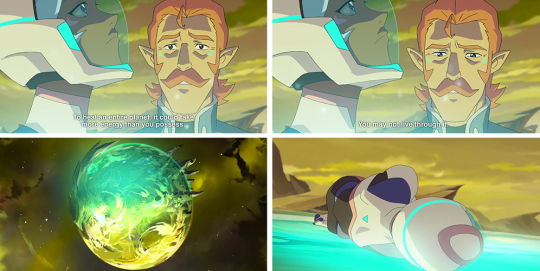
Above: Allura embodies the Life Givers’ philosophy when she risks herself to heal the dying Balmera in Rebirth. Coran says “To heal an entire planet, it could take more energy than you possess. You may not live through it.”
Even before entering Oriande, Allura had enough quintessence—life energy—to heal a dying Balmera. Do all Life Givers have that much quintessence within them? Does this mean that the Life Givers were on par with Allura prior to her entry to Oriande? If so, what power is Oriande giving them that they didn’t already possess? Within the context of Quests for Secret & Sacred Knowledge, it appears that the secret knowledge is about how to use that power to its fullest extent. Surely that comes with a price?
Anon also asks: “How did Haggar get that knowledge?”
Haggar gets the knowledge in the same way that Allura did, by being worthy to enter, and, either by knowing the philosophy behind the White Lion’s trial or by over-powering the White Lion and the Life Givers. The former can appear to be a stretch, but the latter doesn’t make a lot of sense.

Above: Haggar at Oriande, her own Marks of the Chosen, and the difference between her encounter with the Sage Statues and Allura and Lotor’s encounter.
In Season 6, Haggar arrives at Oriande’s location, her Marks of the Chosen appear, thus she gets the ‘all clear’ signal from the White Lion. Haggar is worthy of Oriande. She then enters the temple where we see her doing one of her casting circles as the Sage Statues (e.g. the Life Givers in statue form) are poised to attack.
In the case where the White Lion and Oriande embody Perfectly Good Pureness, it would be necessary for Haggar to over-power them in order to enter as she could not be considered worthy unless Blue & Orange morality applied. At the very least, Haggar was deemed worthy by the White Lion’s arbitrary requirements. So did Haggar over-power the Sage Statues, or did she offer them a gift as Allura did?

Above: Haggar and her druids transferring quintessence to Zarkon, and Allura and the Balmerans transfer quintessence to heal the Balmera.
We’ve seen Haggar and her druids use similar orientations and positions as Allura and the Balmerans do when channeling their quintessence into another being such as Zarkon, or in the case of Naxella, a planet. When they attack with quintessence, and when they reap quintessence via the Komar, their positions are different. This channeling position is used by Haggar in Oriande when she meets the Sage Statues (again, the Life Givers in statue form).
So either Haggar gave them a gift, or she over-powered them. But if Haggar can overpower the Life Givers…then why does she need the secrets of Oriande?
To put it another way, if Haggar can over-power beings capable of (at a bare minimum) restoring a Balmera as Allura did, but after they have ascended to be part of Oriande (so even more powerful right?) then what Secret & Sacred Knowledge could the Life Givers of Oriande possibly bestow upon her that would make any of that effort and risk worth it? Is there something else in Oriande that she may have been after instead?
What secrets are so powerful, that Haggar—who by this line of logic may as well be all-powerful herself—needs them to fulfill her goals?
These same secrets are also now known to Allura, though the argument can be made that Haggar-now-Honerva had much more time to study them properly. These secrets have unlocked Allura’s potential, giving her—as Lotor says during their battle in S6—“all the power in the universe”. Hypothetically, Honerva has unlocked this power within herself as well.
And this is why we've got a case of Blue and Orange morality. For so long as one fulfills some arbitrary requirements, then one is allowed in. The next parts, getting past the Life Givers in the form of the Sage Statues, and passing the White Lion’s Trial relate back to the Blade of Marmora. For the BoM, one has to be thinking like them to pass (Knowledge or Death). For the White Lion and the Life Givers, one has to understand the philosophy underlying their Blue & Orange morality, which in this case, is giving up life for knowledge. Piece of cake for Allura, quite likely easy for Haggar too, not so for Lotor. Understanding their philosophy is alignment agnostic, both the good and the evil can know it and put it to use.
In Lotor’s case, he failed the White Lion’s alignment-agnostic philosophy exam. Even though he learned their ways enough to replicate some of Alfor and Honerva's accomplishments, and got as far as he did, (and I’d argue to understand the bigger picture of what is necessary to bring peace to the universe). He failed because the Galra philosophy of “Victory or Death” came out in him as the White Lion’s threat triggered that philosophy in addition to his desperation to achieve his goal (which in S6E1 we see hints of his anxiousness towards not being delayed further from). He did not fail due to moral alignment.
From Lotor's PoV—as stated by Anon—“It seems natural to fight, when lives of people depend on your success.” This natural way can easily fall under the Galra’s “Victory or Death”, and leads Lotor to fail, therefore it must be at odds with the morality and/or philosophy of the White Lion and the Life Givers. If not, then it at the very least, it must be at odds with how the Life Givers intend for Altean Alchemy to be used, just as Prometheus’ use of the Gift of Fire went against how Zeus and the gods intended for it to be used.
Thus, Lotor is a Promethean character, setting him against Life Givers' and the White Lion’s morality as he wants to take their Gift (e.g. Altean Alchemy via Allura) for another use, as Anon said: “He needed that knowledge so his own “Voltrons" would work with Alteans from Colony.”
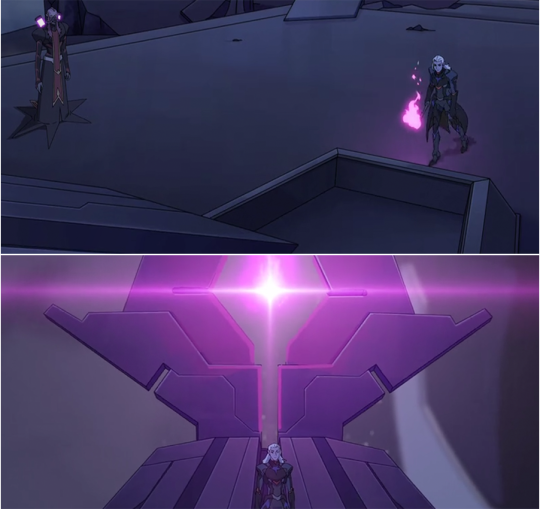
Above: Lotor lights the flame at Kral Zera and double-dipping into flame symbolism.
That other use, what amounts to Altean Alchemy For All, is one that the White Lion’s trial exists to prevent by way of only allowing worthy Alteans to enter. Those worthy Alteans are ‘sacred’, and it is not much of a stretch to assume that they may have once derived their social status from being the only Alteans who can wield this secret power.
While I’m not completely sold on “Voltrons with Alteans” being Lotor's reasoning (definitely for Honerva though), that still aligns with his Dark Savior obsession underlying his desire for power to defend the Alteans himself, or, to enable the Alteans to defend themselves (remember his words to the Puigian leader about how Voltron left the Puigians defenseless). However, Lotor's stated goal—giving unlimited quintessence to the universe for the sake of peace—is analogous to Prometheus taking Fire from Olympus so that the mortals could use its heat and improve their lot. Further, like Prometheus, Lotor is divinely punished for his actions, for via Allura, Lotor stole the means to unlimited quintessence for all (e.g. the Fire) from Oriande and the Life Givers (e.g. Olympus and the Gods).
Divine Punishment:
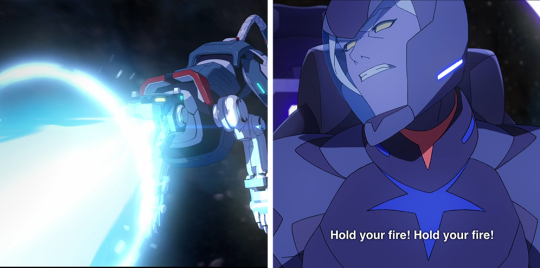
Above: Allura attacks first while Lotor pleads with her. Lotor responds by ordering his generals to hold their fire.
Lotor's divine punishment comes from Allura. Allura takes up a “fight first” instinct multiple times throughout the story, the same instinct that caused Lotor to fail the White Lion’s trial. Allura fights first even though she is from a race that we’re told are excellent diplomats, whose culture and mythological beings (e.g. White Lion and the Life Givers) appear to embody a “giving one’s life rather than fighting” philosophy. This philosophy is what motivated Allura to restore the Balmera at risk of her own life, but her fight first moments throughout the story contradict that philosophy, as well as her readiness to fight rather than embrace a diplomacy-first approach in the case of Ulaz and Kolivan. Allura embraces diplomacy-first when it is easy and convenient.
Two of these fight first times—yeeting Lotor when he was no threat, and attacking Lotor when he was pleading with her—occur after she gained the knowledge of Altean Alchemy from Oriande. I’m not saying that Allura was’t emotionally justified, but part of being the Special Sacred One, is that one is usually required to control those impulses in exchange for the sacred power and knowledge.
In stories where there is a “Here’s this Mythic Sacred Thing you got because of a Quest to a Special Place” event, there are usually conditions upon the continued use of the Thing. Acting against the precepts or philosophy or morality embodied by the Bestowers of the Thing is a Big Deal. It is such a Big Deal, that this conflict appears in stories from nearly every mythology or religion, even if only in the form of the smallest side-story of a minor hero or prophet (e.g. Enkidu from Gilgamesh, or “Don’t look back” for Orpheus and Eurydice).
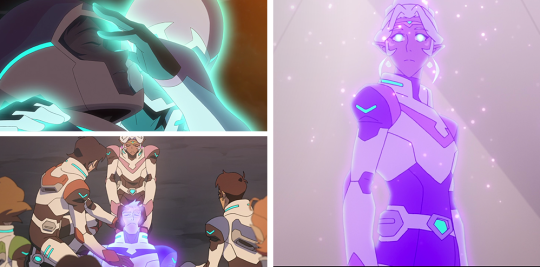
Above: Allura’s power over life on display.
Allura’s got this awesome power now, and it didn’t cost her anything.
That breaks the Quest for Secret & Sacred Knowledge story code (risking her life to not defend against the White Lion barely counts). Allura can bring Lance back to life, shift Shiro’s soul into the body of another person a clone, and myriad other all-powerful plot-friendly things. Yet there is no geas placed upon her? No requirement that she continue to embody the philosophy that allowed her to pass the White Lion’s trial in the first place?
It appears as though Allura's awesome power is inconsistent for when it’s available (cough Plot cough), as in Season 7, she’s a quintessence power house during the fight with Macidus, but she couldn’t save Sanda as she did with Lance?
In the context of Ur Stories, when a Seeker of Knowledge has gained a gift of knowledge and not immediately paid a price—such as when Odin gives an eye for a drink from Urd’s Well of Knowledge—then that Seeker usually has to continue to embody what made them worthy to get the gift in the first place. Or, they must complete some kind of Task or observe a taboo, otherwise they risk the wrath of those who bestowed the gift or lose access to the gift. As Allura does not yet appear to have lost her power, then she may have a Task to complete instead. Violating the seemingly pacifist philosophy of the Life Givers to deliver divine punishment to Lotor may have been permissible given the circumstances.
Finally—Part IV: Payment is Coming Due
While I still doubt that there is anything more to the White Lion than a nod to DotU combined with a basic Quest for Secret & Sacred Knowledge (thus explaining the White Lion’s strange condition for such knowledge), it’s still possible that this is leading to something mythic inline with Ur Stories, especially given VLD’s hellscape setting, dark tone, and love of tragedy. Season 8 could bring us a Playthings of the Gods scenario pitting Allura versus Honerva for reasons beyond the obvious (e.g. a plot twist), or, a tragic fate awaits Allura due to something as classic as Alfor flaking on a Task or Debt asked of him for the knowledge he gained at Oriande (another plot twist).
In many stories where a similar arc or backstory occurred, Alfor should have come back with a Task or a Debt to be called upon at some later date (often tragic and inconvenient). That Task could have been the creation of Voltron, that Debt could have been Allura’s life.
Remember the “I give my life” philosophy?
Time to pay up.
Alfor may have hidden Voltron and Allura from Zarkon, if doing so meant that they would avoid a Tragic Fate for which they were intended by the Life Givers, in exchange for bestowing the secrets of Altean Alchemy upon him. His actions then—in classic Greek tragedy fashion—made the situation immeasurably worse, and the universe paid the price.
Tragic endings are what happens when you back out on a Mystic Deal, or when you try to avoid Fate.
177 notes
·
View notes
Text
Emmy 'Homeland' Hero Rupert Friend Revisits Quinn's Sacrifice - 13 June 2017
As we enter Emmy season — nomination voting runs June 12 to June 26 — Yahoo TV will be spotlighting performances and other contributions that we feel deserve recognition.
He belongs in the Jack Bauer category of TV hero: Peter Quinn, the Homeland paramilitary officer who — spoiler alert, if you’re not caught up! — died in the Season 6 finale, sacrificing himself to save the President of the United States and his colleague/love interest, Carrie.
Joining the show as a guest star in Season 2, actor Rupert Friend quickly turned Quinn into a fan favorite. Viewers were crushed when he seemed almost certainly dead at the end of Season 5, after a sarin gas poisoning while on assignment. And while it was great news that he was alive when Season 6 premiered, he was a very different Quinn, his body and mind badly damaged by the gas, his spirit low, and drugs and alcohol his method of choice to deal with the devastation.
Yahoo TV talked with the Emmy-worthy British actor about his final season as Quinn, including his thrill to have the chance to show what a wounded warrior can do after suffering injuries, what he thinks ultimately severed the bond between Quinn and Carrie, and the story of how he wrote one of the series’ most memorable and beloved segments with Quinn’s Season 5 letter to Carrie.
I’m sure you’ve become very aware of how beloved Peter Quinn is to viewers, especially after the Season 6 finale.
Yeah, I’ve been overwhelmed by the fans’ response. I’m not a big social media, or frankly even Internet, guy, but we just couldn’t help but be exposed to the outpourings of love and remembrance for this character. Sometimes anger. Very, very strong emotions from people, and I guess I realized just how loyal both Quinn’s fans and also mine are, and that was a very wonderful thing to experience. I was very grateful for that.
What do you think it is about him — why did we become so invested in this character?
Can I ask you? Presumably, you follow the show. What is it about this guy?
I think it’s that he made so many sacrifices, and that we wanted so desperately for him to find some… I guess happiness was too optimistic for him, after everything he had been through… but I think we certainly hoped he would find some peace. I think the audience, to the very end, hoped that would be true. He was a funny guy a lot of the time, as well. There was really just a lot to love about him. He was smart and no-nonsense, loyal, and, as you said in another interview, he was more self-aware than any of the other characters.
Yes, I think he came to be. When we first met him back in Season 2, he was kind of a wisea**, kind of cocky, and I think he just knew he was good at his job, but couldn’t talk about his job and didn’t care. He had almost like a kind of frat boy quality about him, in a way. He just behaved as if there were no consequences. What I loved following him through the seasons was seeing his conscience and his soul and his moral code develop, to the point where he questioned his position in the black ops society, what he was being asked to do for money, his relationships, both professional and personal. Toward the end of Season 6, he was really questioning the morality of somebody who would risk his life, awake him from a coma, and [doing] so cause these injuries to his body and mind. Carrie doesn’t seem to understand why that’s morally bankrupt. That, to me, is a big flag of how Carrie and Quinn have really grown apart morally by the end of Season 6. I think one of the things that I loved about him is he wasn’t — we have this expression in the U.K. — a “goody two-shoes.” I don’t know if that exists in America. Do you have that here?
We do.
Yeah, so he wasn’t a goody two-shoes. He wasn’t just an amazing guy who was saving kittens from trees every weekend. He was a cold-blooded killer for money, and he was at times cruel and at times incredibly efficient and effectual in his work. Yet, you always sensed underneath all that, that he had this heart of gold, that he’d be an amazing friend, if only he could learn to trust somebody. My heart broke for him when I realized that he died not ever having found that person. Dar Adal betrayed him, Carrie betrayed him. He had a few one-night stands, and they’re not worth the paper they’re written on. He didn’t really have a friend. He didn’t know his child. It made me realize how lucky I am to have relationships that I trust, because this guy didn’t even get close to that.
His story is very tragic. Do you see him as a hero, though?
Absolutely; he’s absolutely a hero. He’s my hero, and he is someone who pays heroically, in the Greek sense of the word. Especially at the end there, he could perform the ultimate selfless act. I think heroes understand that there is a greater moral code than just putting the self first. There is a sense of, whether it’s your country or peace or just what’s right, they put what’s right before their own interests.
Is it true that you wrote Quinn’s goodbye letterto Carrie at the end of Season 5?
That is true, yes. I’ll never forget… I was actually in Paris. [Showrunner Alex Gansa] had phoned me and said, “Listen, I’ll be honest with you. I’m so slammed here, and I have to write this letter, and I don’t know what to do. I’m running out of time, and I have to write another episode. Do you think you could have a crack at it?” I said, “Sure.” I wrote the letter, sent it off, and kind of thought, “I’ve never been asked to contribute before, and they’ll just say, ‘Thanks a lot, but no thanks.’”
I was in Paris when the episode came in. I was sitting in the Jardin des Tuileries. I remember it very clearly, reading the new episode, and I got to the end and my heart just skipped a beat, because they’d printed the whole thing, word for word. And they called the episode “A False Glimmer,” which is a direct quote from the letter. I was like, “Wow, this episode is titled [with] my words, and it ends with my letter.” It was an incredible moment.
I think a lot of fans felt very angry that we didn’t get to see Quinn’s memorial service. That letter is the only thing that really gives us a bit of what that would have been like, a bit of closure.
I haven’t watched Homeland at all, but we watched the finale, like a respectful thing to do for Quinn, actually. [My wife] Aimee and I watched it as sort of a sendoff, and it was a bit jarring that nobody showed us how anyone celebrated this guy, the few people that knew him. As he says in the letter, “Don’t put a star on the wall for me, don’t say some dumb speech.” Then I think, “Okay, so how did these few people, who are not allowed to publicly celebrate him, remember him privately? What did they do? Did they go somewhere magical and special and sacred to him, and did they say some words? Did they pour a little whiskey on the ground? What happened?”
I missed that, and then afterwards, no one spoke about him. Carrie didn’t speak, Saul didn’t speak, Dar didn’t speak. Then I started thinking, “Hang on a second. If we didn’t see his body, no one checked his pulse…” Do you know what I mean? I’m like, “Maybe they dragged the President out of the car, took her to a safe place, and then what we don’t see is that they pulled Quinn out of the car and rushed him away.” He was only shot in the shoulders. Do you know what I mean? I was like, “Oh, I don’t know. Now, I’m going to feel really stupid giving all these death interviews.”
Is that really a possibility? Are you going to get another call from Alex, do you think?
On this show, everything is possible. The end of Season 5, I was taken aside and given a few thoughts by Alex. Then, I came back in Season 6, and it was very different, but I came back. I’ve been told it’s absolutely the end, but yeah, I agree with the fans. It’s funny, though, I also feel like maybe the fans remembering this guy in their own way is the best memorial that he could have had.
Quinn was going to die at the end of Season 5, came back in Season 6, in such a huge way. Do you think he should have died at the end of Season 5, or are you glad for all of the things that you did get to do with the character in Season 6? That he got to do even more heroic things, and portraying those injuries in such a realistic and respectful way — veterans and their loved ones have reached out to you about how much that meant to them, the way that you portrayed that.
First of all, thank you, because portraying a modern returning veteran, with modern injuries, truthfully was the top of my agenda. It’s something I will never understand, sacrifice in a way that veterans sacrifice. The only thing I can do is to try to pay tribute honestly, and that was a hugely important thing for me. I’m so grateful that we got a chance to tell the end of Quinn’s journey in this completely different way, to take this beloved action hero guy and make some realistic, circumstantial changes to his life. As you mentioned, I was in touch with veterans, with PTSD survivors and sufferers, with people who had strokes, with specialists in aphasia, with doctors from Veterans Administrative hospitals, doctors who specialize in chemical warfare. I also put on 20 pounds — I wanted [to show] that idea that if you sat in an institution, eating crappy food, you don’t exercise, you’ve just given up on life, and you’re just this kind of lump, you’re not the fit soldier that you used to be. There was a lot of stuff that I did to help that. It didn’t take any effort — wearing the hair, and not washing it, and just kind of being really quite gross, horribly scraggly beard and all of that stuff, just to really show that feeling of giving up that he had at the beginning of Season 6, that he has to overcome.
The response has been amazing, as you said, from the people that matter the most, which are the people that feel represented by this character. I’m very proud that we’ve had a hero in television — a major character in a big, popular TV show — who has basically been an action hero, while he’s semi-paralyzed, struggling with linguistic programming, and perhaps is unable to really formulate language he needs, and he can’t use both hands. We haven’t seen that before, and yet there are soldiers out there who are being wounded and continuing to fight. We know that happens, we just don’t get to see it. Whether that’s fighting in a battle, or coming home and fighting against prejudice or social exclusion or the inability to get work, or, how are you going to work if you’ve only got the use of one hand? That’s a fight that soldiers face. For soldiers, the fight doesn’t stop when they come home. The fight just changes, because we’re not really ready, as a society, to welcome soldiers in an effective way.
One of the best things about Quinn’s story in Season 6 is that the focus really became about what he could do, that he was still Quinn. He still had all of Quinn’s capabilities, and he found a way to be able to utilize all his skills.
Yeah, and I’m glad that that came across, because Quinn’s always been a man with great agency. He’s someone who can do. If you’re in trouble, if you need something, he’s someone I would want to call. That never went anywhere, and watching him go from giving up, and smoking crack with hookers in slum dens, to going, “No, I am the guy that can load and level a gun with one hand. I am the guy that can engineer a hostage scenario with trained military operatives, with one arm and one leg working” — all of that was real. There are no tricks. Everything that happened, one-sided as it were, happened with just one arm and one leg.
Just thinking about where the character started, you were a guest actor, and now to all the things that we got to learn about him, and all the things we’ve seen him do and go through… the series has been his story as much as anybody’s. I would guess that it’s tough to let go of him.
Yeah, I don’t think I’ll ever fully let go of him, just because there’s something pure at the heart of Quinn, which I love. I think when you’re lucky enough to play somebody who has that effect on you, my privilege is I get to choose to take that with me. If I was to play somebody horrific, and I’ve certainly done that, I get to choose to say, “I don’t want any part of this. I’m washing my hands of this. This was a character that served a story, and that’s the end of that.” With this guy, there is so much strength and agency and goodness underneath, that I guess I feel it’s my job to carry that forward a little bit.
Having played this character who was so layered, and really has become a Jack Bauer-level hero, is it tougher to think about your next role? Do you find yourself comparing other roles to Quinn? And do you now maybe want to go do a comedy, or something just very different from Quinn, from Homeland?
Yeah, it’s a good question, and yeah, the answer is it’s a tough benchmark to follow. I think the mistake would be to compare roles to this one. To start, I got to play this guy for five years, in real time, which I think was about seven years in TV land time. That’s a privilege that you never get in the movies. You might play someone over the course of their life, but you’re going to do it in three or four months. There’s a depth there that is exciting in and of itself.
And yes, I would say to do something completely different — I think most actors are looking for that. I was lucky enough, before Season 6 began, I played a role in Armando Iannucci’s dark comedy The Death of Stalin, with Steve Buscemi, Jeffrey Tambor, and Michael Palin, who are all heroes of mine. I’m effectively the clown in the movie. I’m the ineffectual, drunk, spoiled son of Joseph Stalin. It’s ridiculous, I make a complete fool of myself every time I’m in the movie. And it was joyous. That was before Season 6, and now I’m looking at what to do next, and looking for something that is, yeah, either layered and wonderful and interesting, and/or completely different.
What if you did get a call from Alex Gansa this summer saying, “False alarm there, we do want to bring Quinn back again in some way.” Would you consider it, or would it depend on what they wanted to do?
I think the fans would riot. I would not be responsible for their actions. Yeah, I would want to know in what capacity. I would expect it was realistic, because we stuck to that all the way through. If you’re talking about a zombie Quinn, it’s not really a good thing; an angel, a ghost Quinn, all of that stuff is a little soap opera, but the writers are too good on Homeland to ever do that, so I wouldn’t worry about that
18 notes
·
View notes
Text
WIP Meme
I was tagged by @tdcatsblog for the WIP meme and for the following two weeks, I was wondering what to say. I have a folder-ful of incomplete fics, dating all the way back to >10 years ago, but are they still WIP? Or are they abandoned?
I starting reading through them, some of which I’d completely forgotten the storyline of. Some had me intrigued even—what was going to happen? WHY DID I STOP WHEN I’D HAD SO MANY WORDS ALREADY? I wish I can finish them, but...I don’t write the same way anymore, for better or for worse. So... the question as to whether they’re abandoned or WIP remains to be seen.
Here’s a taste of the weirdness sitting in my backup:
The Acolyte (Harry/Draco): Draco was a hairdresser serving the peasants of Hogsmeade. One day, Minister of Magic Potter visited and asked for a magical haircut that made his hair impenetrable to hair potions. As it turned out, Minister Potter had been caged by the Ministry to play a politician, a perpetual fundraiser for a bankrupt / corrupt government...while someone--their identity unknown (even to me at this point)--was moving to overthrow Harry Potter, and everything Harry Potter stood for, by means of a new found religious cult named the Herdsman of Xe, which had already caused a wave of religious fanaticism through the British countryside by mimicking the old Wizarding Patronus-based religions. It would be up to Draco to help Harry figure out what was going on... by making himself an acolyte in the cult...
(I tend to write stories with awful, awful governments...)
Other examples of Why-Can’t-I-Write-A-Happy-Story-Like-Everyone-Else:
1) Upon the Midnight Clear (Draco-centric): Draco, for his grey moral character, was sentenced to neither passing on nor walking in limbo after his death. Instead, his job was to be a sort of Dark Angel who collected the souls sucked up by the Dementors, now living far up north after the Ministry had Banished them. The Dementors became his family, and he was particularly close to a Baby Dementor who he’d named Corvus...
2) A Change of Allegiance (Harry/Scorpius): Draco pulled Scorpius out of Hogwarts when his Veela trait developed, but sent him back a few years later--so Scorpius could do his OWLs and NEWTs--while begging for Scorpius to be re-sorted Gryffindor so that Harry Potter, as Griffindor’s head of house and the Defence of Dark Arts teacher, could watch over his son. It turned out that Scorpius’ destined mate was a terrible human Scorpius’ humanity refused to / could never be together with, and it would be up to Harry, divorced and an asexual himself, to figure out what to do with Scorpius’ mating urges that could never be quelled...and the heartbreak they brought for the young Malfoy....
3) Lila (Harry/Draco): Lila was the teenage daughter of Harry and Draco and the narrator of the story. Harry and Draco’s marriage was on the rocks when the story began... then, Harry murdered for his Auror job, and he got pregnant with the tiny piece of his soul that had turned loose but didn’t become a Horcrux (the murder, while intentional, was done for a non-evil cause). It was then Lila learned that she was born of the same circumstance, out of a killing...
4) Fallen (Harry/Draco): Frayach’s Powerful Men, written in Draco’s POV. It was a mess, but I’m including this since @tdcatsblog has a Frayach-related writing project too. This may be the exercise I will redo <3.
Tagging...er, I dunno. Everyone who wants to play?
#pie writes#No pie tries to write#pie memes#pie feels brave today#two tumblr posts a day!#better press post before i chicken out
5 notes
·
View notes
Text
Multiculturalism Is The Problem, Not The Solution
In 2011, the then British Prime Minister David Cameron shocked Europe’s elites when he declared that multiculturalism had failed in Britain. The idea that all cultures are equal and that they can happily coexist in one country is preposterous. It just doesn’t work.
Cameron knew all too well that Britain could no longer ignore the danger of expanding and competing cultures within its own borders, cultures that in failing to share Western institutions and culture – all originally based upon Christian principles — threatened British national identity.
This is especially relevant in Europe today where we are seeing Muslim immigrants who do not, in any way, share the same beliefs as Western culture does, failing to assimilate. Just look at Germany in its present state, for example.
Culture reflects the beliefs held by the people of a country. In fact, cultures are formed by those beliefs. For a society to survive it has to have one culture — a culture that enjoys the participation and useful contributions of all of its peoples. That is true diversity.
Instead of one people, we have been divided up into categories and pitted against each other. Instead of being united, we have succumbed to the dreaded multiculturalism cancer which divides and conquers.
E puribus unum, which means that out of many states (or colonies) emerges a single nation, should be our motto. That is the motto of the United States and that should be the motto for the rest of the world.
This is precisely what multiculturalism used to be up until roughly the mid-20th century when the cultural Marxists hijacked the term and used it to mean something totally different.
Multiculturalism has essentially bankrupted our society through the process of minority appeasement and contrived victimhood – especially of Muslims. The West has capitulated to political correctness, which is a byproduct of multiculturalism, allowing it to supersede the Christian values, beliefs and philosophies that they were founded upon and made them materially successful.
The irony of it all is that multiculturalism is a policy of exclusion, rather than inclusion. It is a policy that is entirely opposite to it’s purported purpose of unity for all. It’s a program of separation, not integration. It’s a program of division and race-baiting, not harmony.
True immigrants don’t arrive on the shores of Western countries to radically change them — they come because of the abundant opportunities that are simply not available back in the stinking hell-holes from which they came.
When they reject everything the West stands for in terms of freedom of speech, Christian values, free markets, capitalism and democracy, then we know we have a very real problem. I’m talking very specifically about the large quantities of fundamental Muslims whose one and only goal is raping and pillaging the West, living off our abundance and affluence, taking advantage of our apathy and radically changing all aspects of our culture for the greater advancement of world domination with the end goal of establishing a global Islamic caliphate.
That, in my opinion, is a very dangerous reality and something that many Western nations haven’t yet woken up to.
Such malarkey is tied to the doctrine of cultural relativism which is the idea that the principle of a person’s beliefs and activities should be understood and accepted by others in the context of that individual’s own culture. It conveniently aligns with the false notion that all cultures and religions are equal, that all can coexist and no one system or set of values holds a place of superiority.
And as a consequence of that flawed thinking, the boundaries of what is morally right and wrong have been severely blurred by virtual cultural lines.
Originated to fundamentally transform the West at one point, the concept is now entrenched in the very fabric of Western culture and to repeal this nonsense will be extremely difficult, not to mention highly controversial in this world that seems to be dominated by senseless liberals and social justice warriors.
It is time for us to accept that the only way to be truly progressive is to push for cultural assimilation, not cultural co-existence.
Given the extreme rate of moral decline in the Western world – and certainly the world in general – such an idea may only be a reality in the realms of a Christian utopia where all dwell together in peace and harmony.
Nevertheless, we must not stand by and do nothing while our culture is hijacked and destroyed before our very eyes. We must do all we can to stem the tide of the jihadis bent on wiping out the Western world in order to establish their worldwide Islamic kingdom
- Caleb Stephen | Freelance Writer (thedailycaller)
3 notes
·
View notes